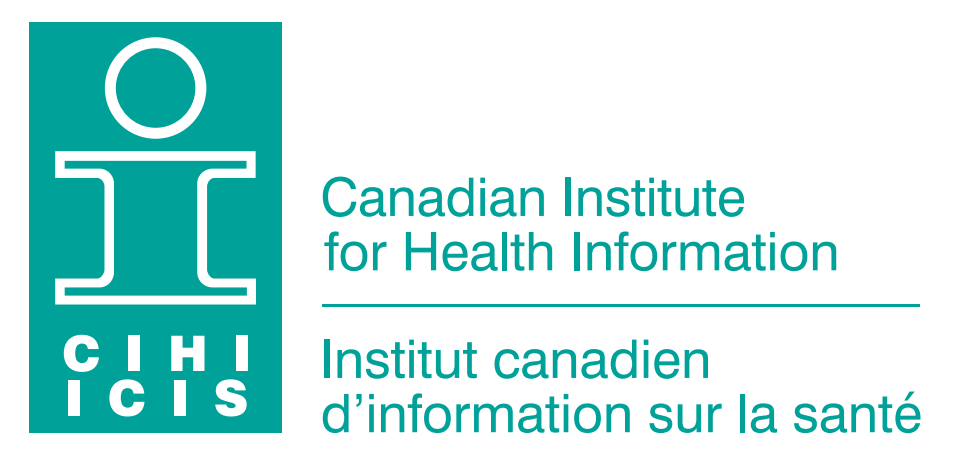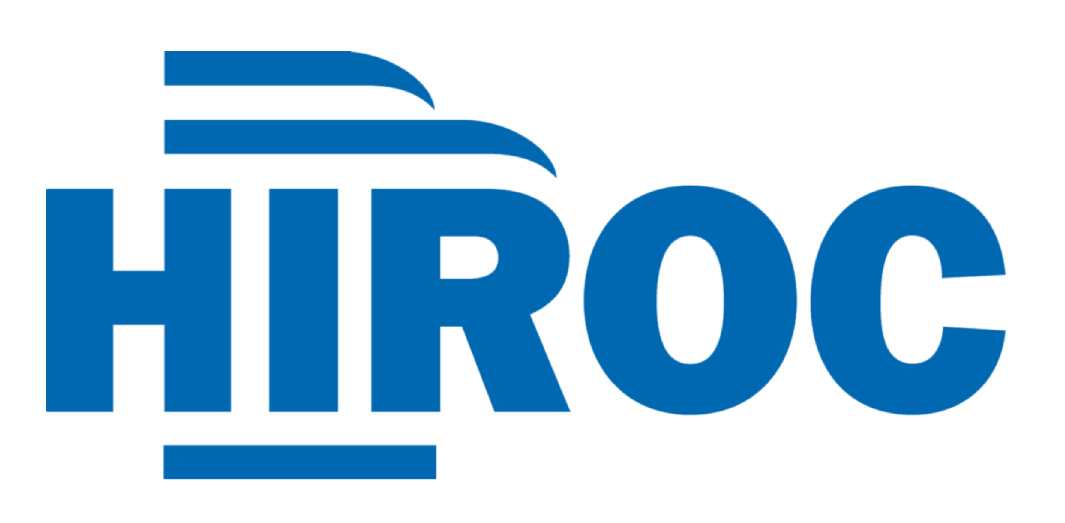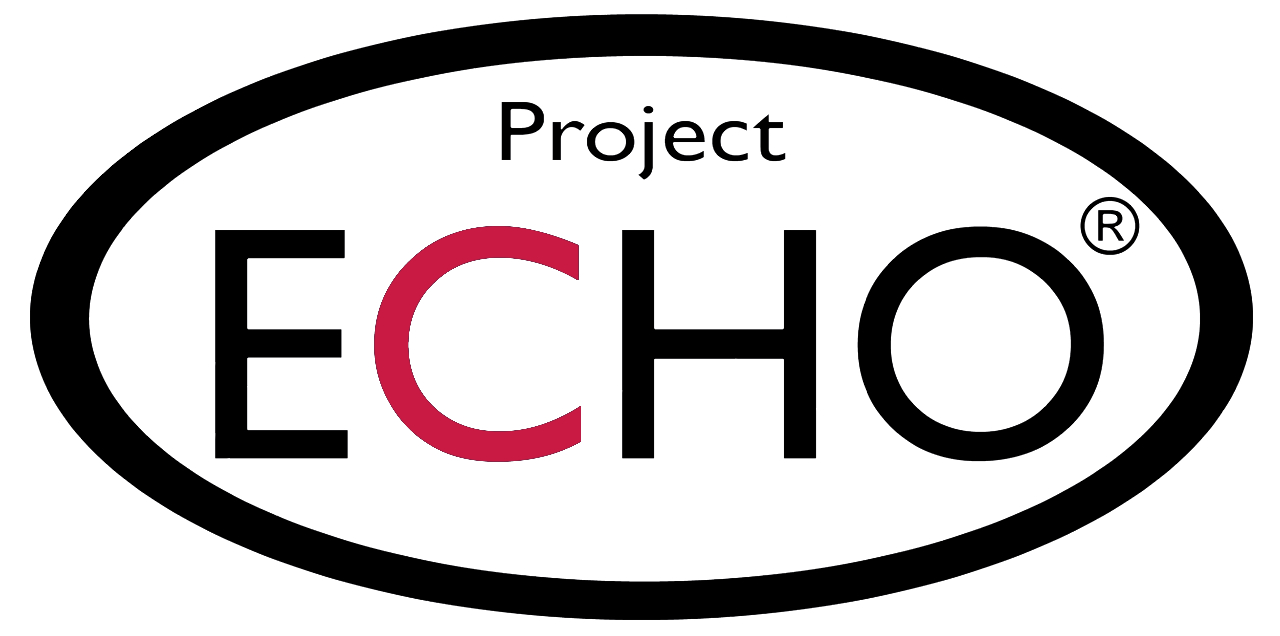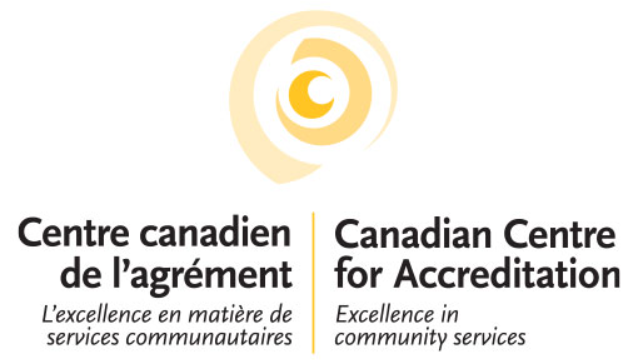
What a wonderful two days we’ve had at the Alliance’s Annual Conference “Co-Designing the Future of Primary Health Care” on June 5 & 6, 2024! From start to finish, the energy was electric, and your participation made it truly memorable. In case you’ve missed it, let us relive all the key moments and highlights of the Conference!

Opening of Day 1:
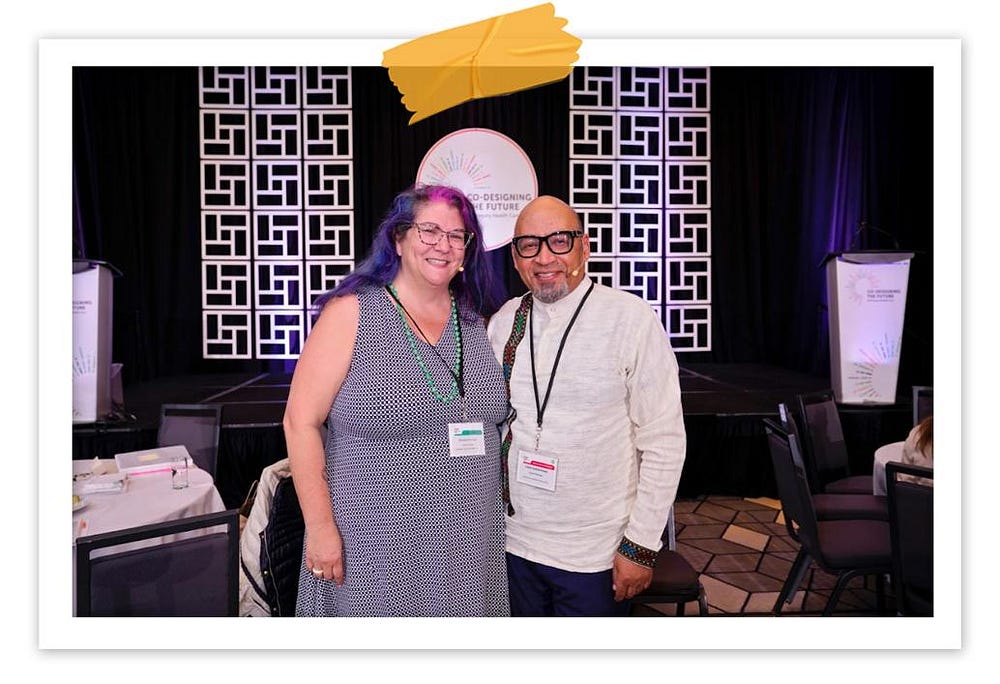
After acknowledging the traditional territories we gathered on, and paying respects to the Indigenous peoples and the rich histories and contributions of those of African descent, our wonderful emcees Michelle Hurtubise and Liben Gebremikael kicked off the first plenary with a warm bilingual welcome.
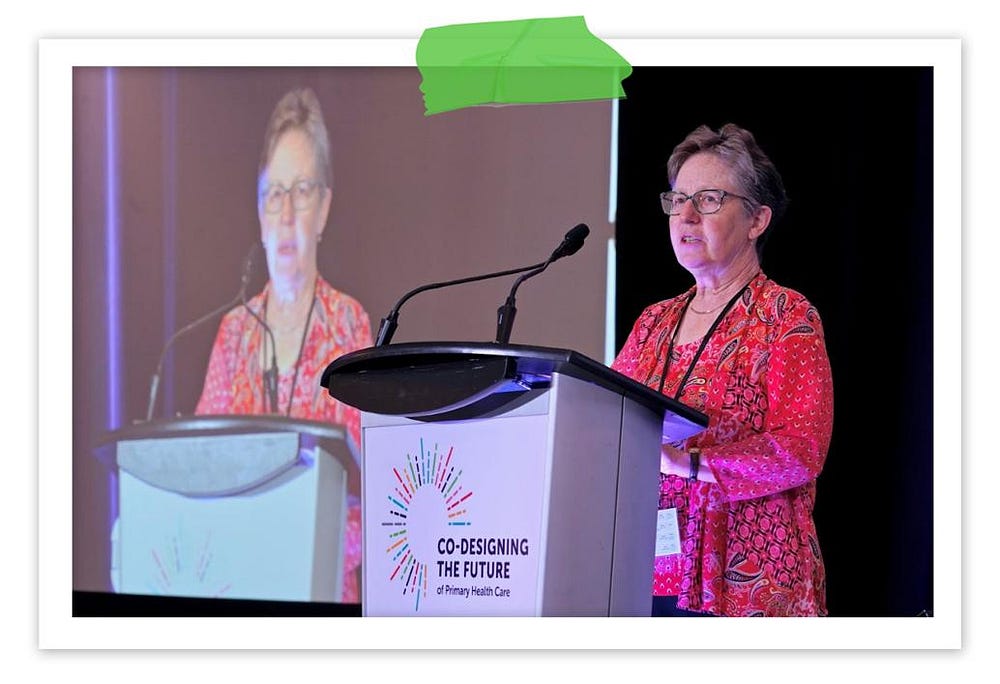
Aniko Varpalotai, Chair of the Board of the Alliance for Healthier Communities, welcomed us with inspiring words about future-proofing our healthcare systems, before introducing The Honourable Deputy Premier of Ontario and Minister of Health, Sylvia Jones, who followed with insightful remarks.
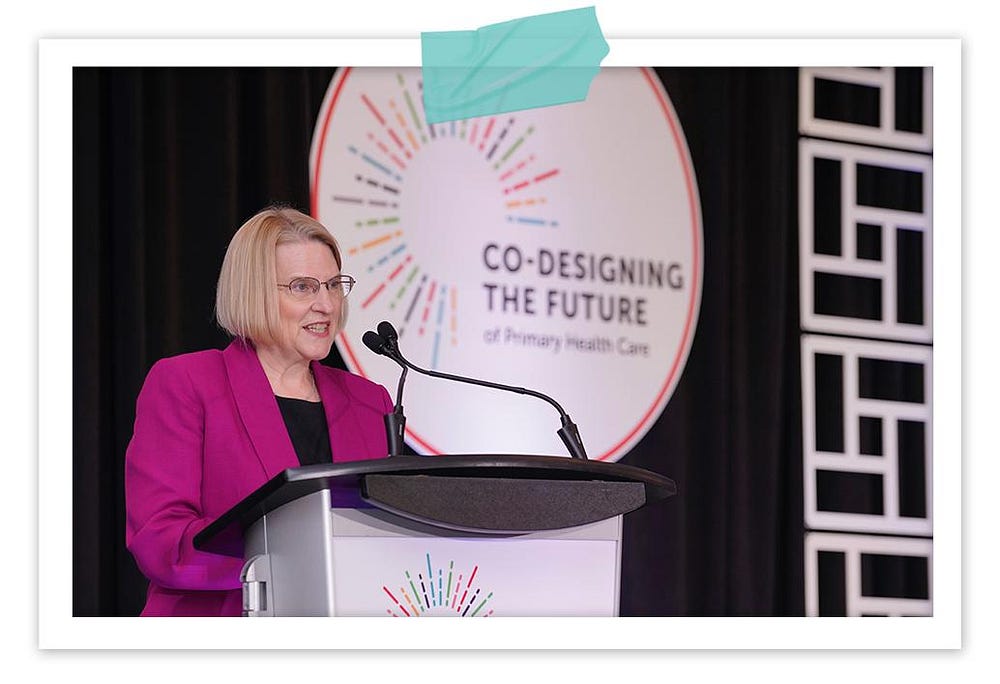

The Minister set a hopeful tone for our discussions by highlighting the government’s efforts in connecting more people to primary care across the province, adding 78 new primary care teams and making record investments to ensure people have access to the care they need.
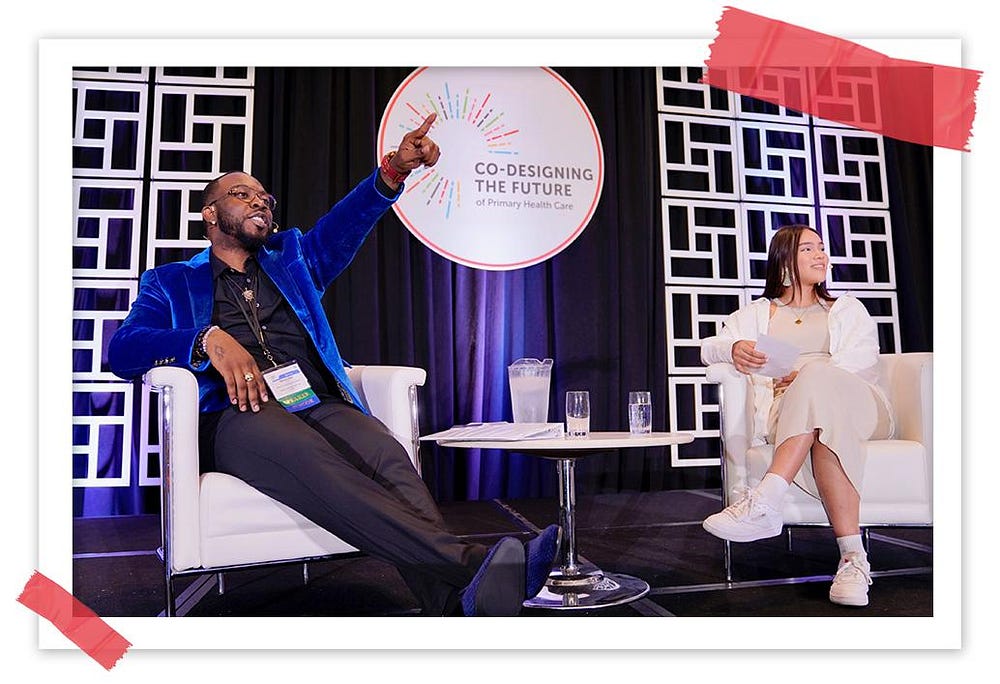
Plenary 1: By the Water — Exploring Indigenous Health in relation to Environment
The morning’s plenary conversation, “By the Water”, featured the inspiring Autumn Peltier, a passionate advocate for water protection and Indigenous rights. Sponsored by the Indigenous Primary Health Care Council and moderated by Marlon Cole, Director of IT/IM and Communications at IPHCC, the plenary showcased Autumn’s journey and what initially inspired her advocacy work. She shared touching stories about her aunt Josephine Mandamin, who walked the shores of the five Great Lakes and founded the water-protectors movement, an Indigenous-led campaign to demand respect for water.

The conversation highlighted the broader issues of health equity stemming from the lack of clean water in Indigenous communities. Autumn emphasized the crucial role health organizations can play in addressing these inequities. She also shed light on the significant environmental challenges facing Indigenous communities, particularly in relation to water quality and access, and discussed how traditional Indigenous knowledge can be integrated into modern primary health care practices to improve health outcomes.
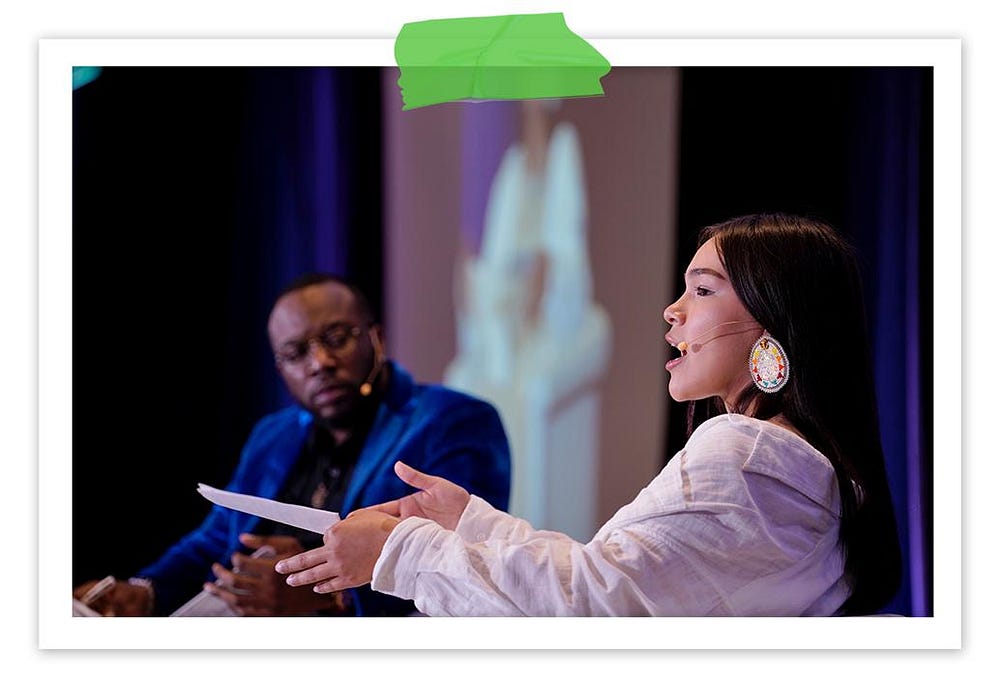

Autumn concluded by outlining policies and actions she would like to see to better support the health and environmental needs of Indigenous communities. Her vision for the future of Indigenous health and environmental stewardship left the audience with a powerful call to action, urging everyone in the primary health care sector to contribute to making this vision a reality. “Land back is more than just land”, she concluded in a powerful statement.
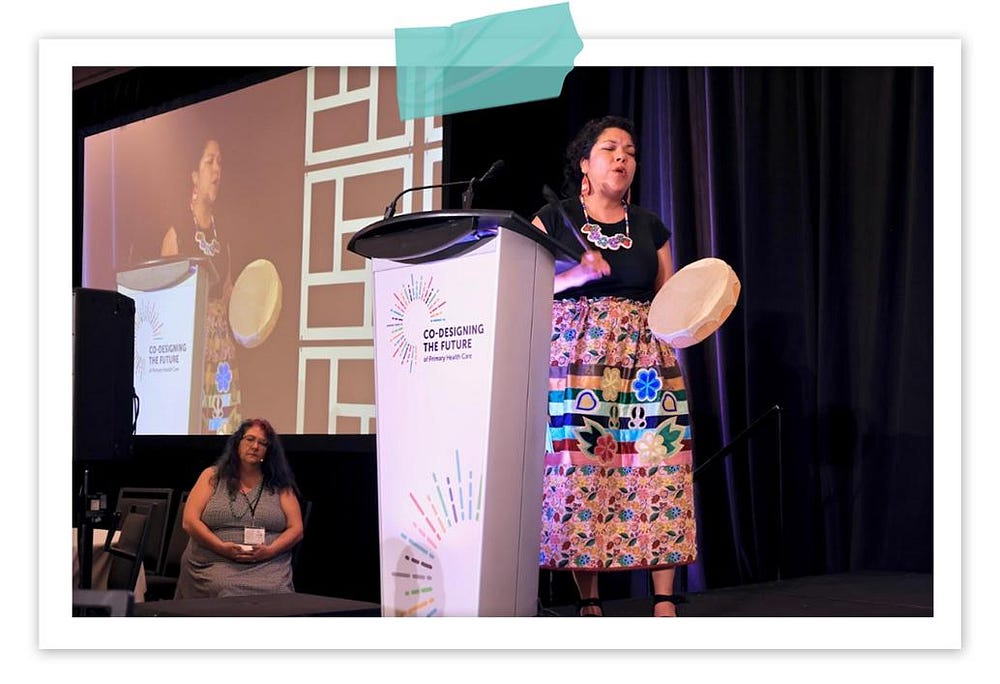
The session ended with a welcoming Indigenous song, performed by Mandy Mack, the Traditional Healing and Wellness Manager at IPHCC.
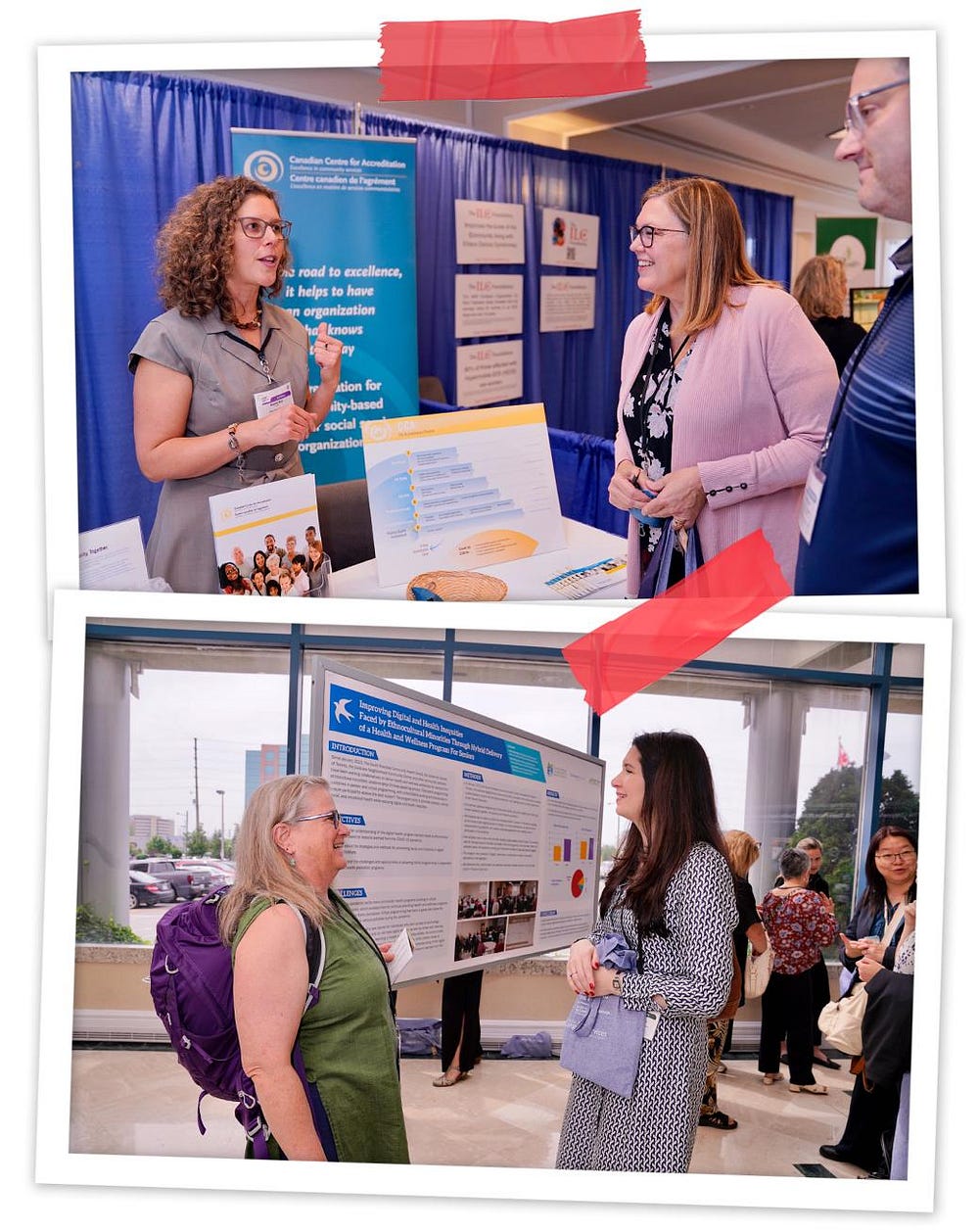
The exhibit area buzzed with activity, offering a wealth of information and networking opportunities. The Exhibitor Passport challenge added a fun twist, with the promise of a fabulous prize for those who visited every booth. The fourteen Poster Boards got a lot of attention too.
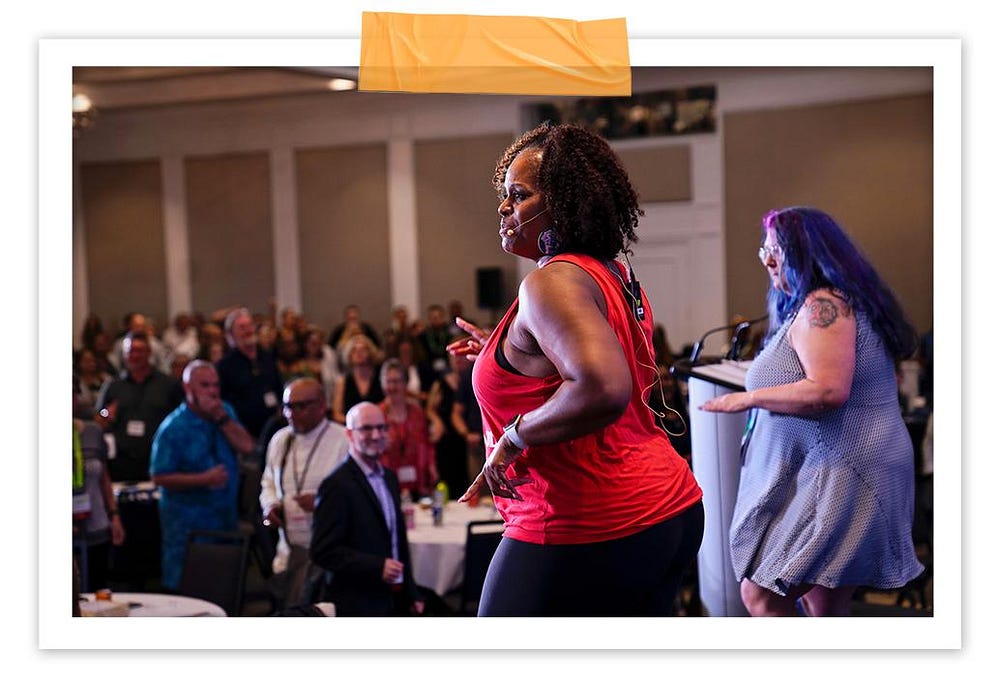
Fitness Break
As we returned from lunch, we kicked off the afternoon plenary session with an invigorating dance exercise led by Tamara Alleyne-Gittens, who has been graciously guiding dance fitness at TAIBU CHC for over 10 years. The room buzzed with energy as we all stretched and moved.
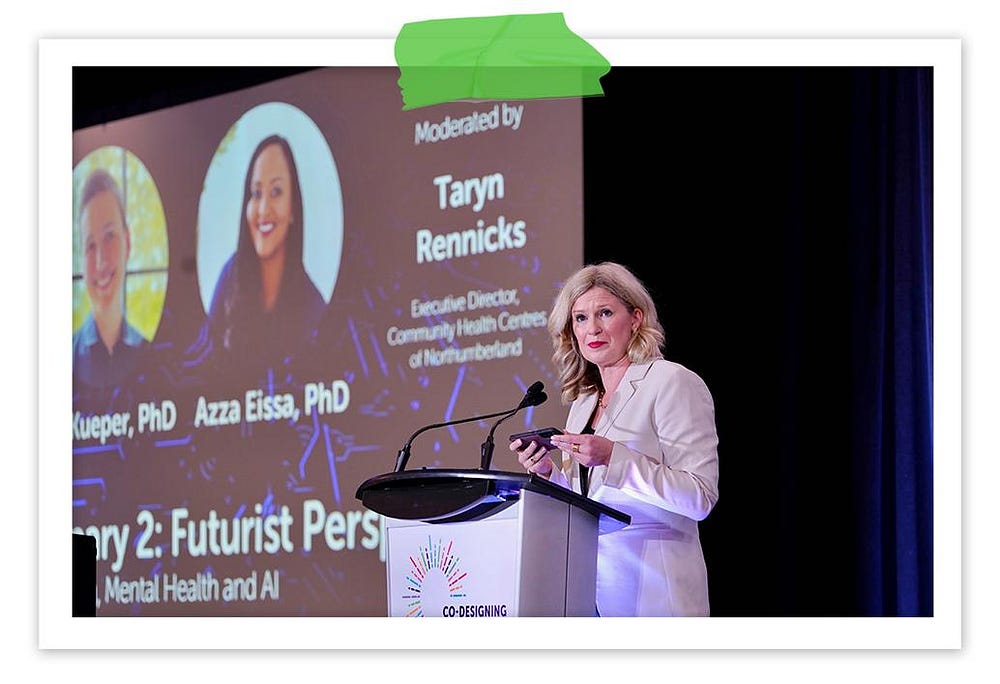
Plenary 2: Futurist Perspective on Health, Mental Health, and AI
Once we settled back in our seats, Michelle introduced the guest host for the second plenary, Taryn Rennicks, the Executive Director of the Community Health Centres of Northumberland and chair of the Alliance Executive Leaders Network’s Information Management Committee.
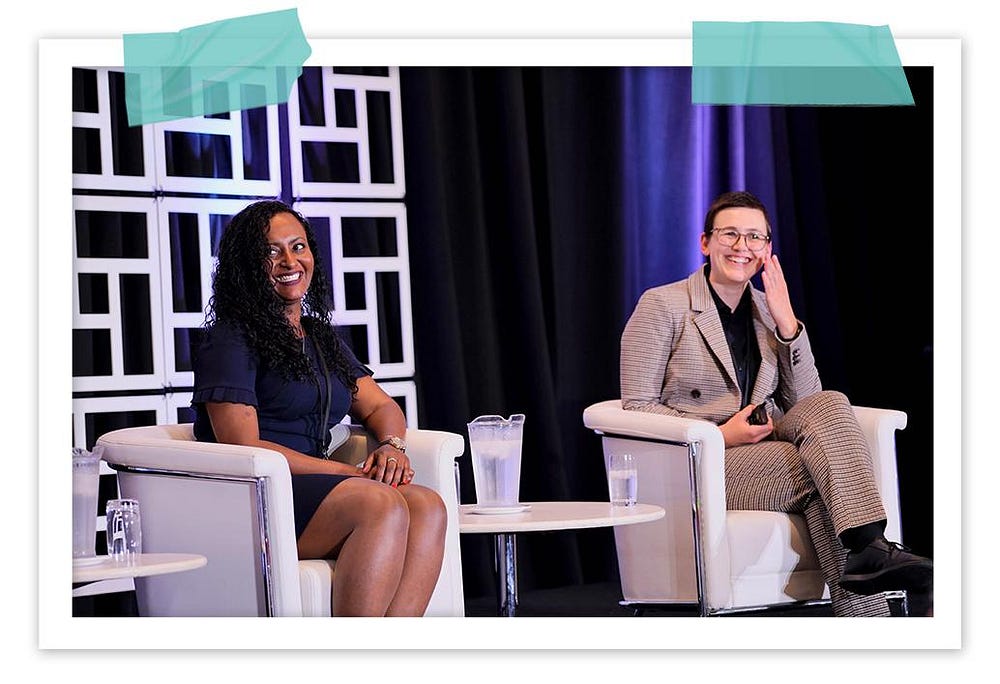
Taryn welcomed everyone to “Futurist Perspectives on Health, Mental Health, and AI,” a session focused on the current and future applications of AI in primary healthcare and chronic disease prevention, particularly for marginalized populations. She introduced the expert panelists: Dr. Jaky Keuper, Research Lead at the AI Deployment and Evaluation Lab, and Dr. Azza Eissa, a Clinician Scholar at the University of Toronto. Both brought a wealth of knowledge and experience, with Jaky’s pioneering work in epidemiology and computer science, and Azza’s extensive background in biochemistry, laboratory medicine, and family medicine.
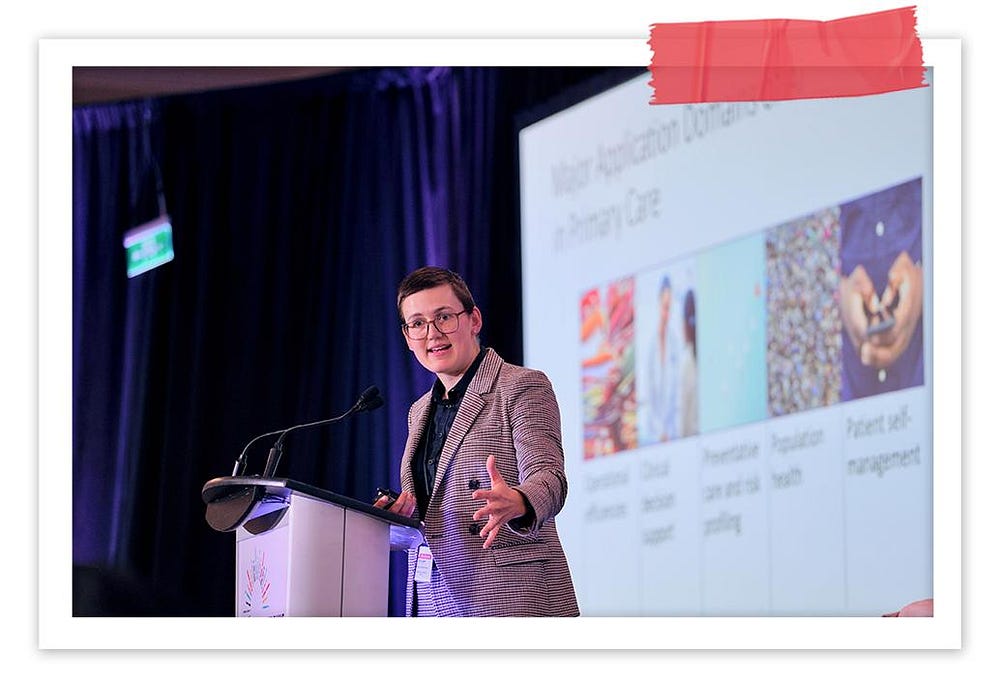

Jaky Kueper kicked things off with an engaging journey through the history of AI in healthcare, from its humble beginnings in 1972 to the sophisticated multimodal AI of today. She broke down AI as a collection of techniques that enable computers to perform intelligent tasks, with machine learning being a major player. Kueper highlighted AI’s impressive capabilities, such as data exploration, prediction, decision support, language processing, and text and image analysis and production. She explained how these applications are revolutionizing primary care by boosting operational efficiencies, aiding clinical decisions, promoting preventative care, enhancing population health, and empowering patient self-management.
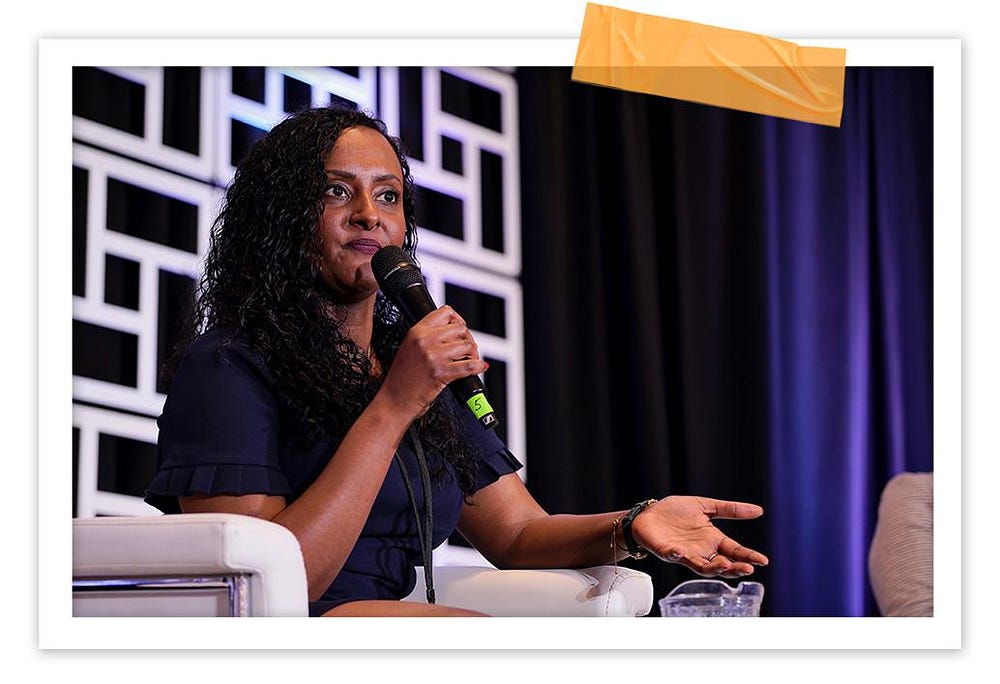

Azza Eissa grabbed our attention with a compelling discussion on the racial biases and inequities in AI health risk prediction algorithms. She used a striking example of facial recognition technology struggling to identify dark-skinned individuals due to lack of representation in training datasets. Eissa revealed how AI tools, trained on healthcare utilization, often misjudge the health needs of Black patients compared to White patients. This bias leads to inequitable risk scores and healthcare outcomes. She passionately argued for the need to address these biases and outlined ethical considerations in AI tool design, access, and use, stressing the importance of inclusive data representation and the impact on physician-patient relationships.
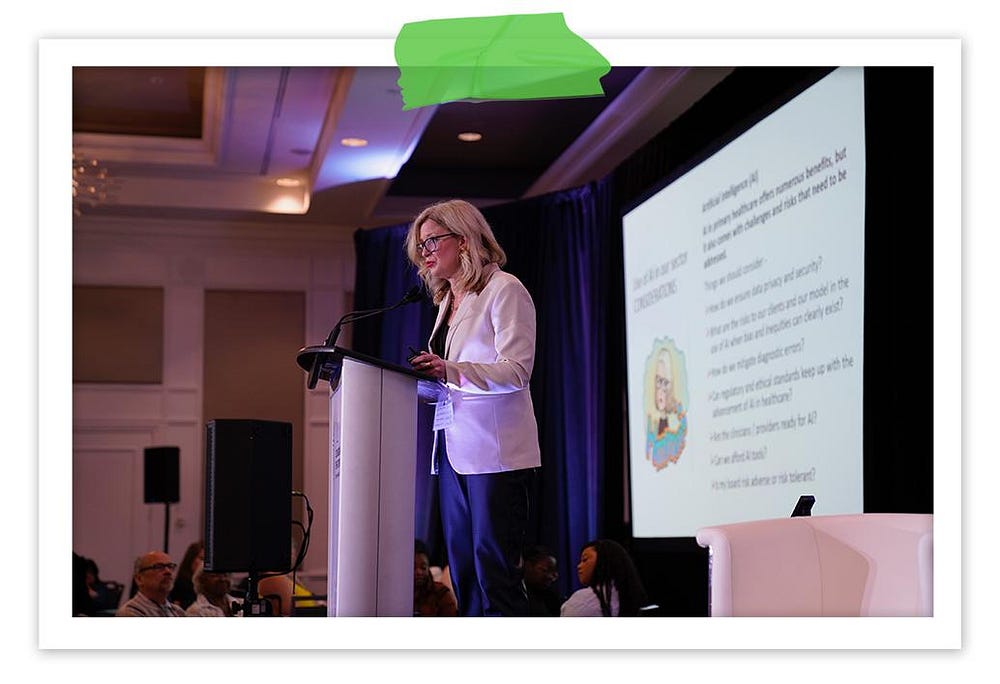

Taryn Rennicks brought a lively perspective to the conversation on AI’s potential in primary healthcare. She highlighted AI’s promise to improve diagnostic accuracy, personalize treatments, optimize workflows, and boost patient outcomes. However, Rennicks didn’t shy away from the challenges, pointing out issues like data privacy, bias, transparency, and integration. She called for a thoughtful, patient-centered approach to implementing AI and posed critical questions about data security, diagnostic errors, and the readiness of clinicians for AI.
Community Health Champion Award
Following the session, Liben introduced Elise Harding-Davis, a member of the Alliance Board, to present the 2024 Community Health Champion Award. Elise, an esteemed African Canadian Heritage Consultant, spoke about the importance of partnerships and support within the health, social, and community services sectors.
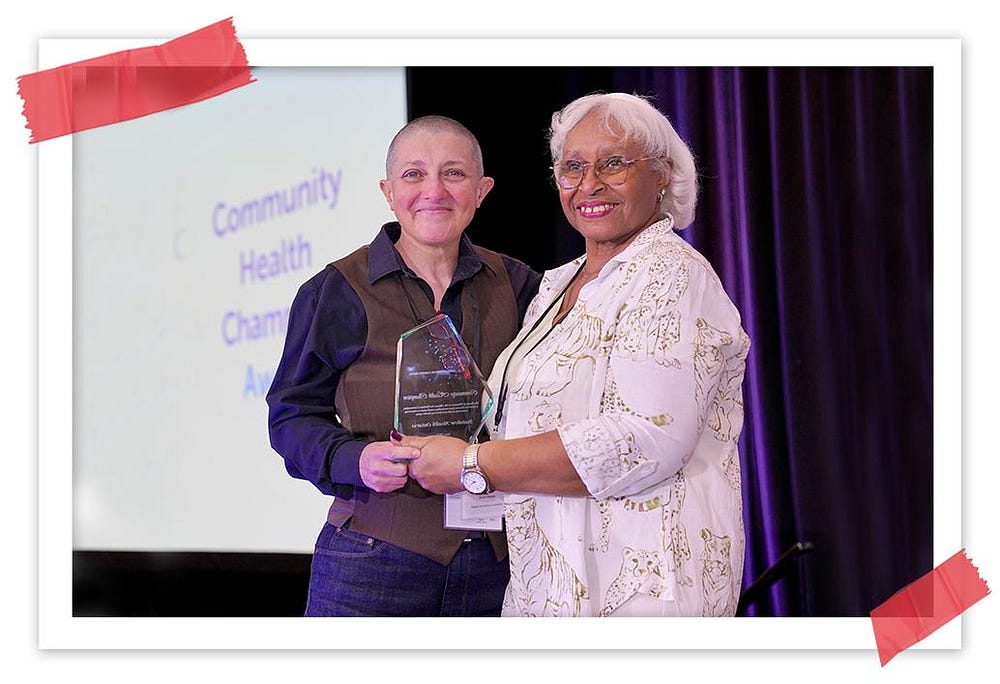

Elise then announced the recipient of the Community Health Champion Award, Rainbow Health Ontario, a program of Sherbourne Health dedicated to improving healthcare for 2SLGBTQ+ communities. She highlighted Rainbow Health Ontario’s work in training healthcare providers, supporting system change, and connecting 2SLGBTQ+ individuals to useful and essential services. Sil Hernando, Senior Program Manager for Rainbow Health Ontario, accepted the award and shared her thoughts with us.
Transformative Change Awards Gala
Now we arrive at the moment that we were all waiting for; the Transformative Change Awards Gala! Oh, and what a night it was! In the words of our MC, Coco La Reine, it was “a celebration of hope, courage, and unconditional, radical love.”
All three of this year’s Transformative Change Awards went to programs that engaged people with lived and living experiences.
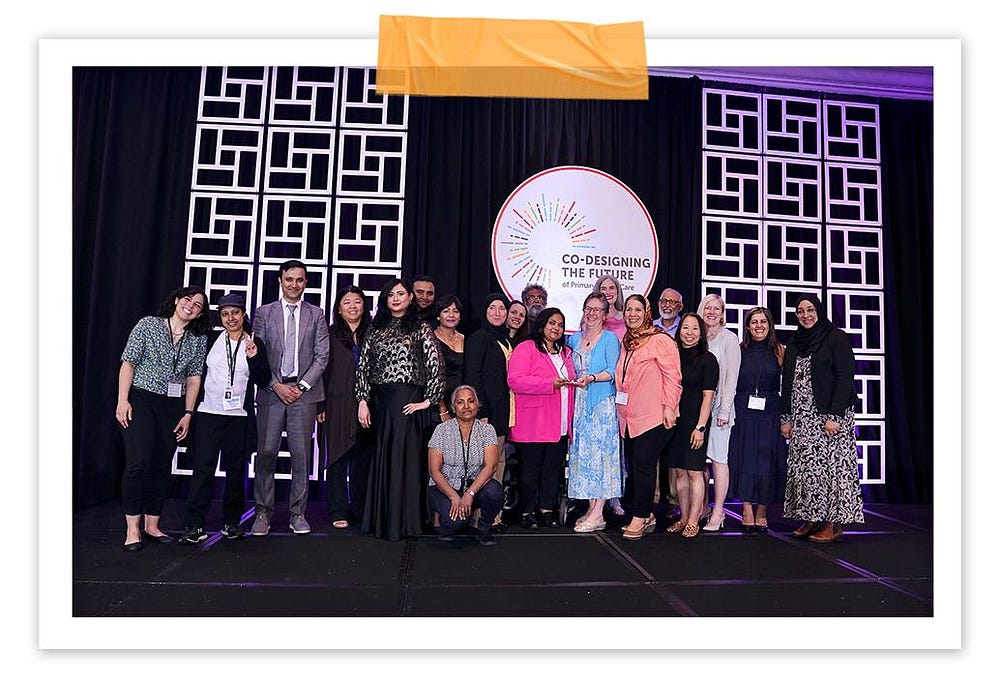

- East Effort, an East Toronto Collaborative led by Flemingdon Health Centre, mobilized Community Health Ambassadors to build trust in the community and connect people to the supports and services they need.
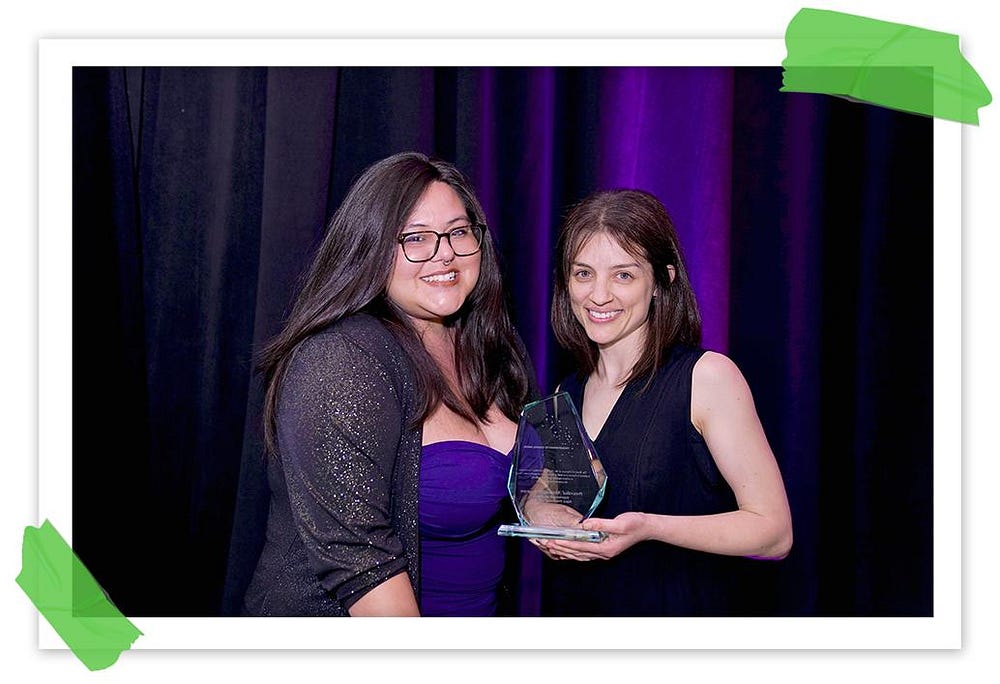

- The Prescribed Alternatives Program operated by the Peterborough 360 Degree Nurse Practitioner-Led Clinic, was the first prescribed safer supply program run by an NPLC. Nurse practitioners work to their full scope of practice, hand in hand with peer leaders with lived and living experience, who lead the work from planning, through development, to implementation and evaluation.
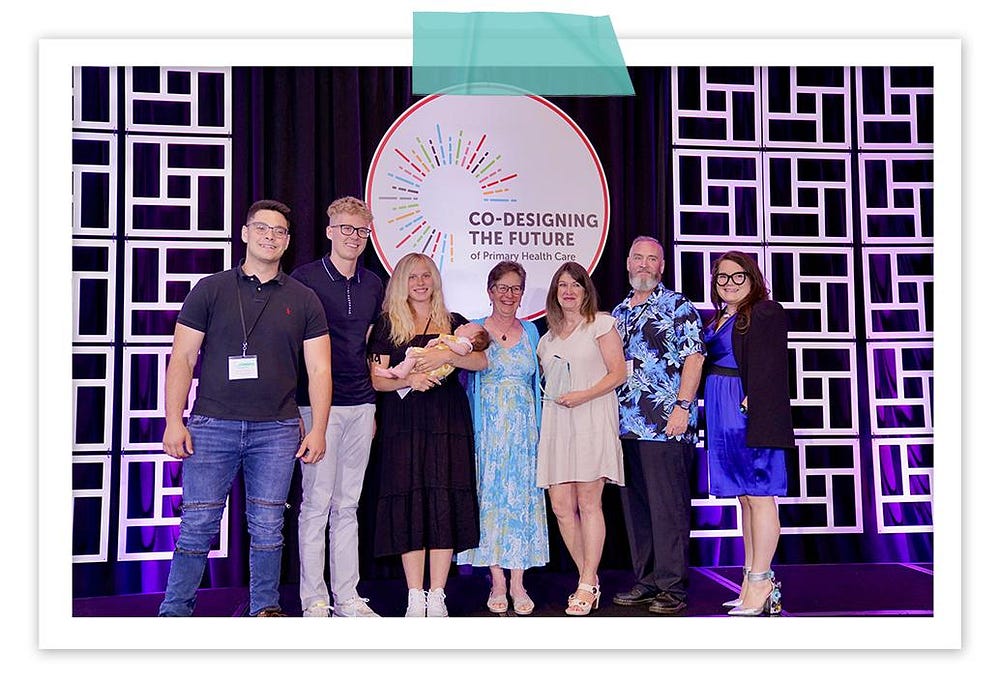

- Niagara HELPS (Homelessness Emergency Liaison and Support) is a peer support program run by Quest Community Health Centre for people experiencing homelessness who attend emergency departments in St. Catharines and Niagara Falls. Peers help clients with system navigation, advocacy, and connection to services in the community.
In addition to these three programs, our awards gala honoured the achievements of three individuals whose work in our sector has embodied radical love.
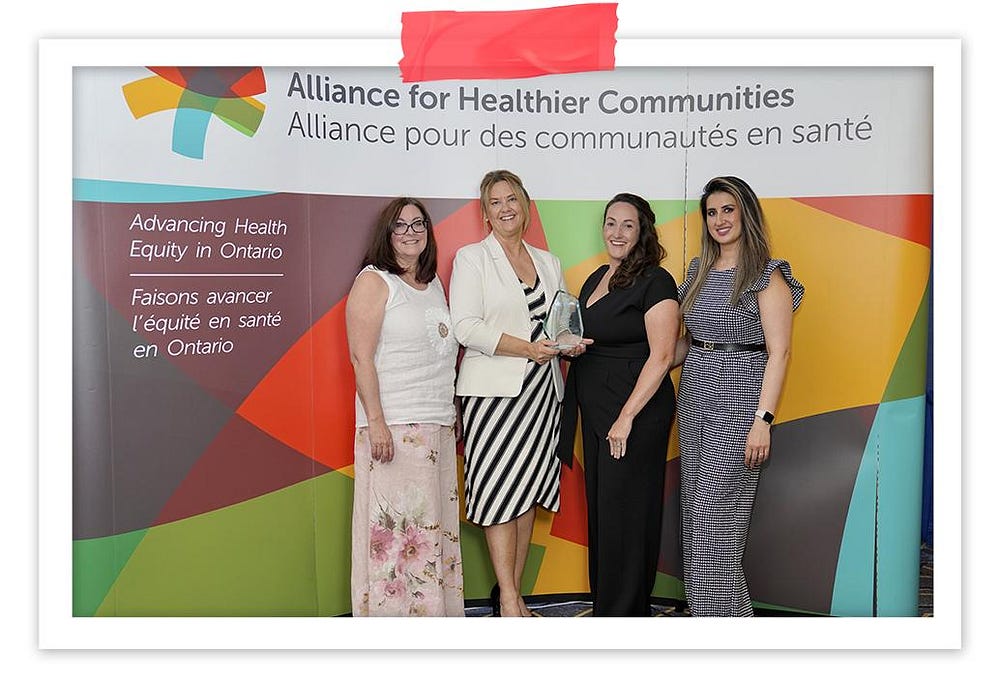

- Tara Groves-Taylor, CEO of Community Healthcaring Kitchener-Waterloo, received the Adrianna Tetley Legacy Award, which honours emerging leaders. Tara has made significant contributions to improving the health and wellbeing of refugees, people experiencing homelessness, and people living with mental health and substance use issues.
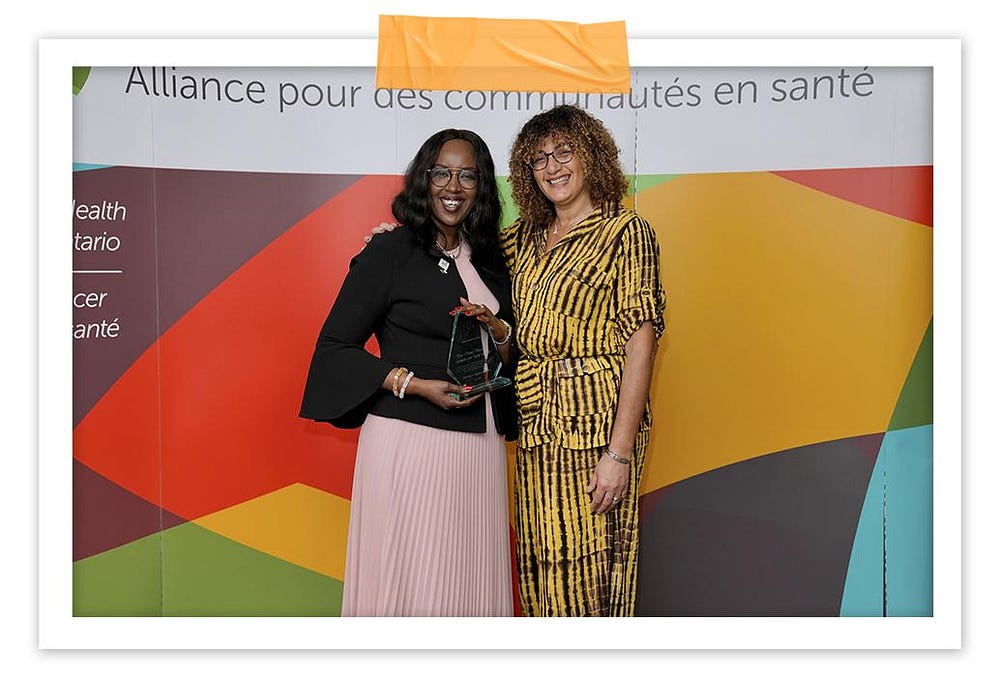

- Florence Ngenzebuhoro, former CEO at the Centre Francophone Du Grand Toronto received the Denise Brooks Health Equity Champion Award, which celebrates individuals who have made outstanding contributions to poverty reduction, advancing health equity and social justice. Florence, who came to Canada as a refugee, co-founded the “Mouvement ontarien des femmes immigrantes francophones de l’Ontario” (Ontarian Movement of Francophone Immigrant Women of Ontario) in 2001.
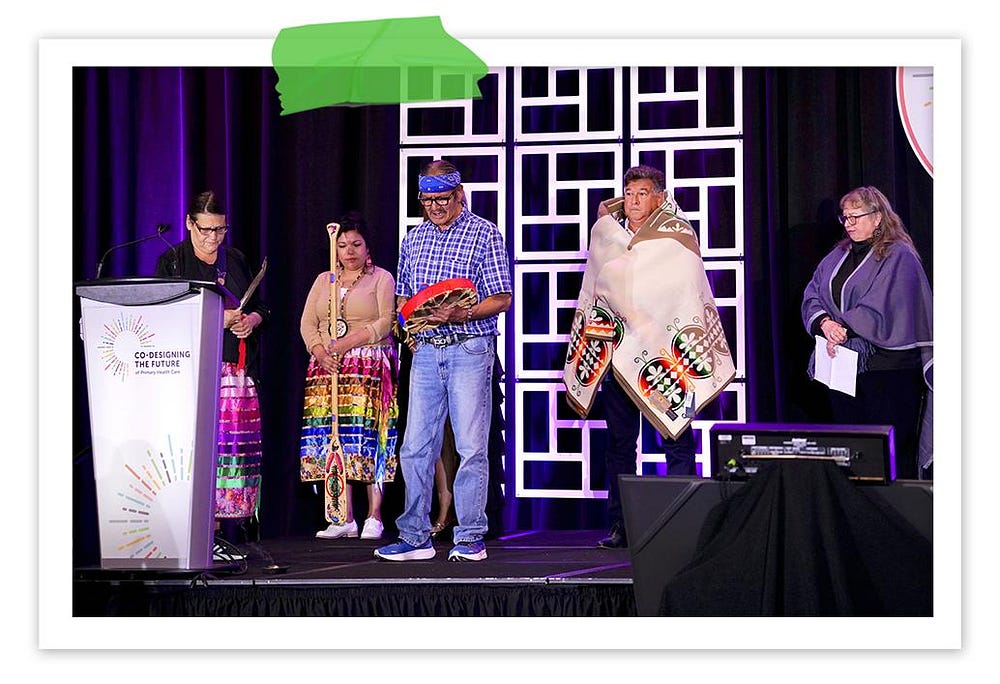

- Brian Dokis, former CEO at SOAHAC, received the Joe Leonard award, presented to an individual who has demonstrated extraordinary leadership, commitment, and support for creative solutions to advance accessible, high-quality and affordable health care. Brian led SOAHAC’s growth to six locations across Southwestern Ontario, and he was an active leader of the AHAC Executive Leaders Circle, the forebear of Indigenous Primary Health Care Council. In addition to the Joe Leonard award, Brian was honored by the IPHCC and Indigenous Elders with a Blanket Ceremony and a gift of a painted paddle.
Read all about the awards in this detailed blog post.
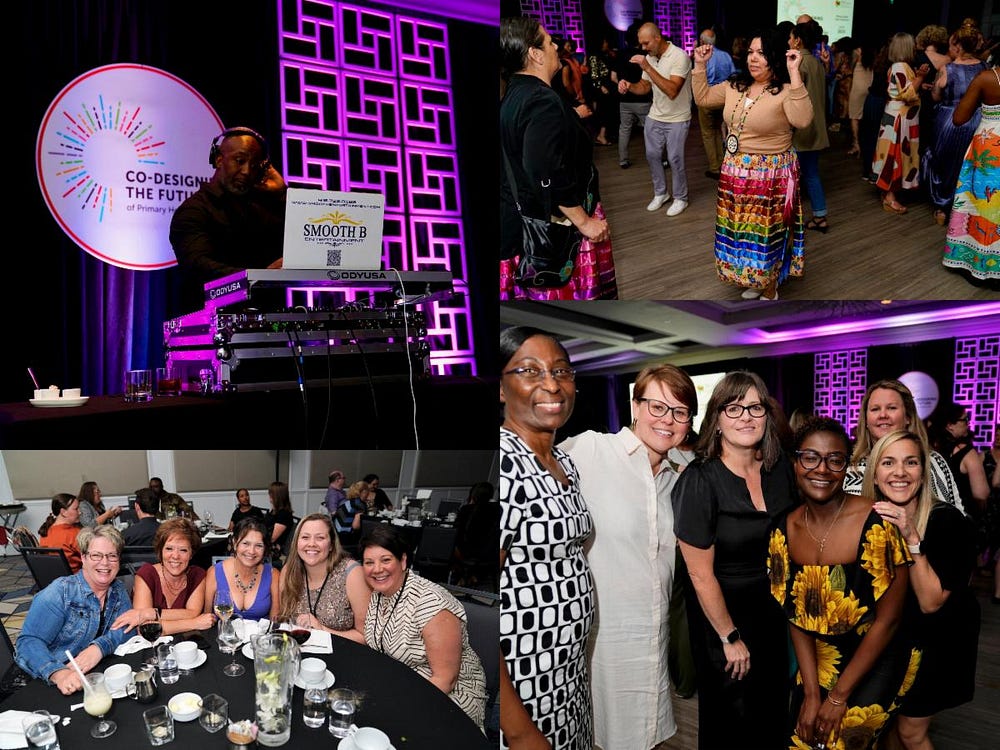
We are grateful to all of this year’s award recipients and nominees for the courage, effort, dedication, and love that powered their amazing achievements. Now it’s time to hit the floor with our awesome DJ!

As we kick off Day 2 of the conference, Michelle welcomed everyone back, energizing the crowd with her enthusiasm, and Liben gave us a short recap of the previous day’s activities and discussions.
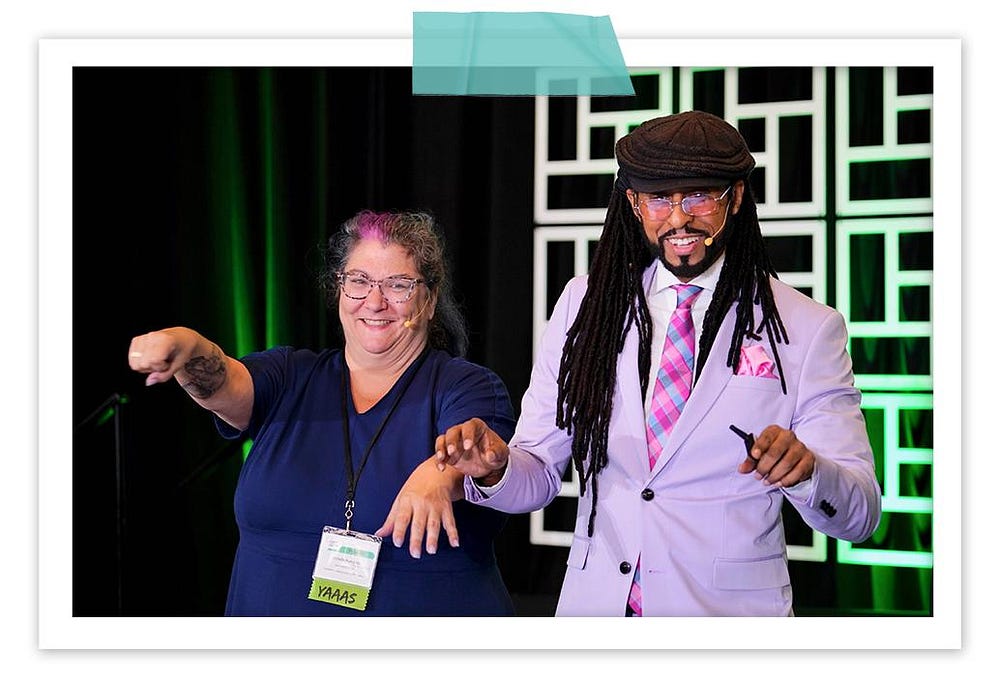
Plenary 3: Impact of Climate Change on Equity Deserving Communities
Michelle then introduced Dr. Mustafa Santiago Ali, CEO of Revitalization Strategies, the Executive Vice President of Conservation & Justice for the National Wildlife Federation, the former Interim Chief of Programs at the Union of Concerned Scientists, and an instructor at the American University at Washington DC.
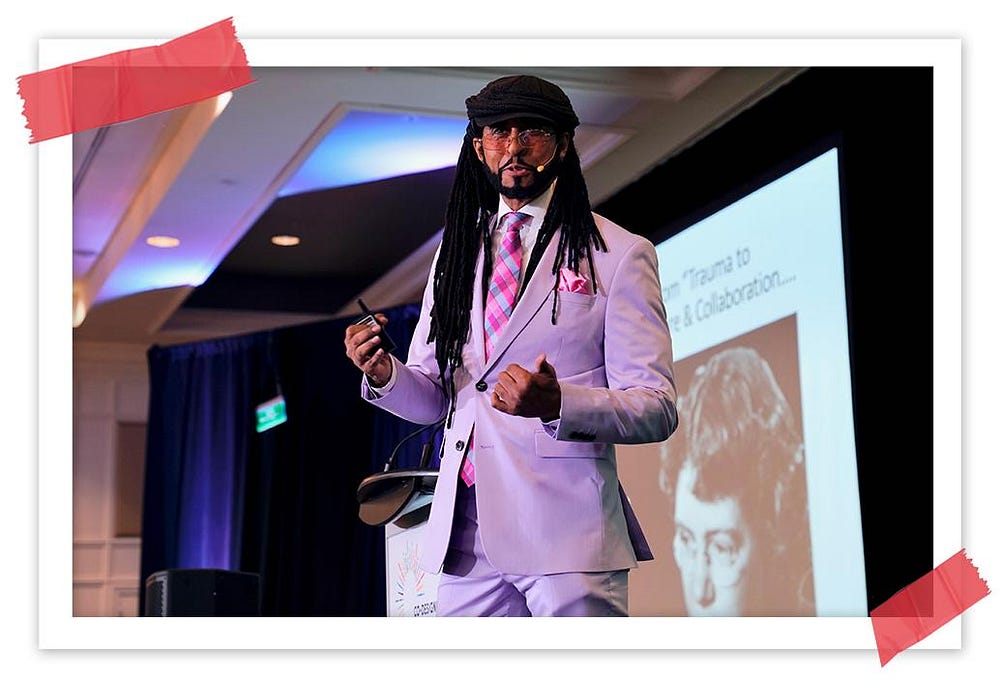

Dr. Mustafa Ali delivered an energetic and engaging keynote, focusing on the intersectionality of environmental justice, climate change, and the collective power to create positive change. He outlined the troubling actions and policies that have historically laid the groundwork for environmental injustice and trauma, emphasizing the need to move vulnerable communities from “trauma to transformation” through the power of advocacy and collaboration. Dr. Ali highlighted the impact of air pollution in Southwestern Ontario, particularly in industrial areas like Sarnia’s “Chemical Valley,” and discussed the broader implications of toxic algae blooms and the extensive networks of fossil fuel pipelines in North America.
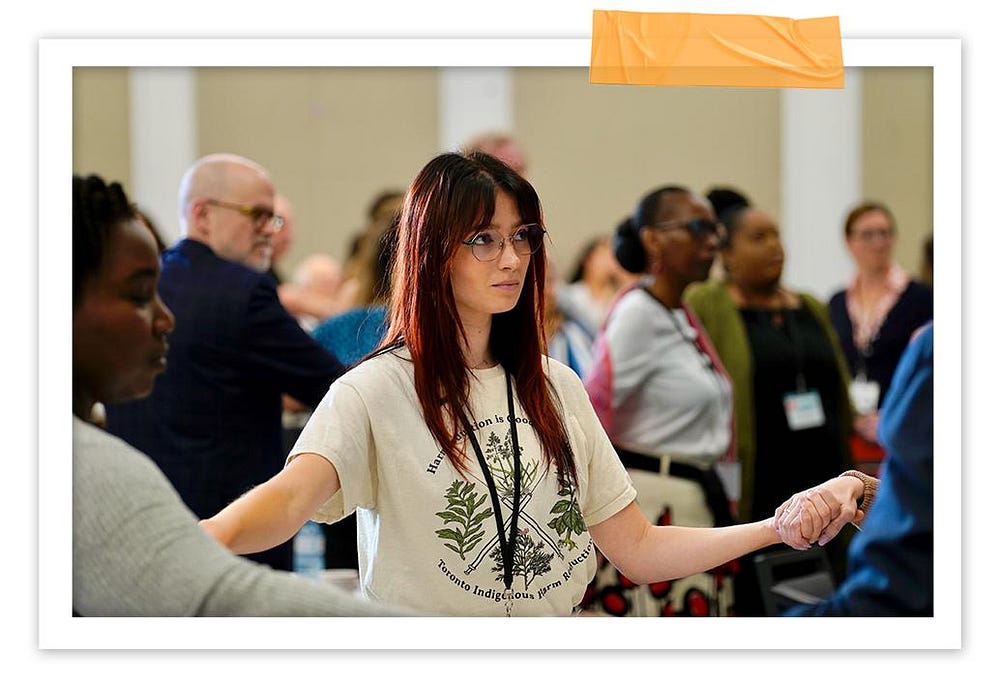
Dr. Ali stressed the importance of moving vulnerable communities from merely surviving to thriving by addressing these environmental challenges. He pointed to numerous initiatives combatting climate change, such as federal grants, philanthropic efforts by celebrities, green home projects, solar farms, and the Billion Oyster Project. Concluding with a call to action, he quoted his grandmother, “You have power, unless you give it away,” urging everyone to use their power to create positive change and win the fight for climate justice. The session ended with everyone holding hands, symbolizing unity and community.
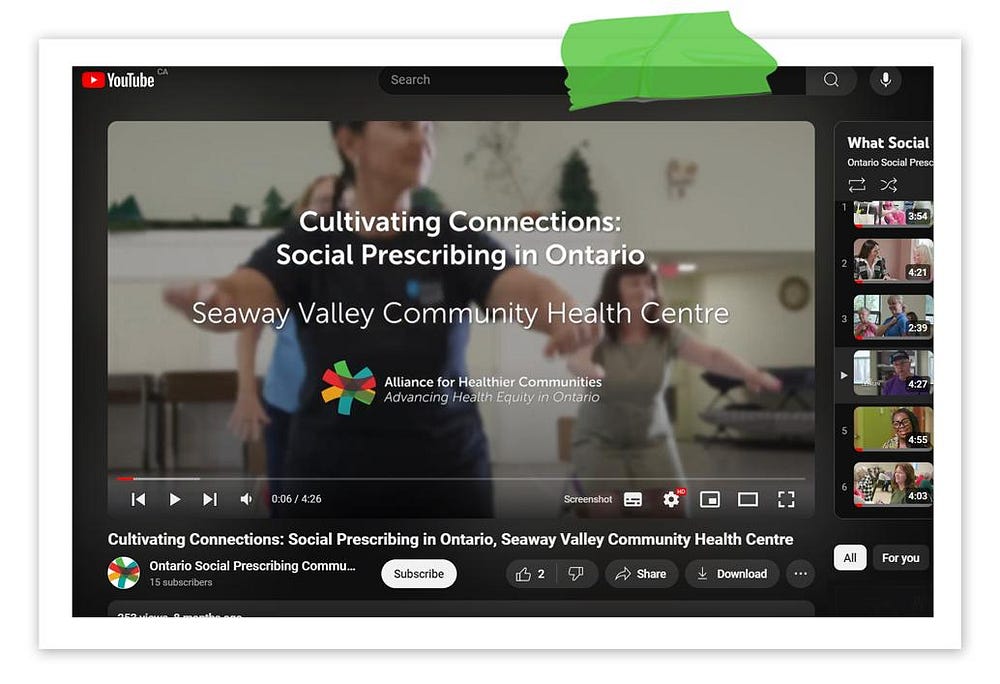

Social Prescribing
After Dr. Mustafa Ali’s inspiring keynote, the screens lit up with a vibrant compilation of social prescribing activities from various health centers, showcasing innovative and community-driven approaches. The first video provided a broad overview, feasturing insiring examples from Centre de santé Hamilton/Niagara, Seaway Valley CHC, Regent Park CHC, and Lakeshore Nurse Practitioner Led Clinic, followed by a deeper dive into TAIBU CHC’s tailored programs highlighting the impactful work being done to meet the unique needs of Black communities.

Fitness Break
After lunch and two knowledge-packed Learning Sessions, the delegates were ready to dive into the final leg of the conference with the fourth and last plenary, but not before another exciting dance exercise with Tamara! As we moved through the invigorating 10-minute exercise, Tamara Alleyne-Gittens made sure to include a more varied and exciting routine, energizing everyone for the last stretch of the conference.
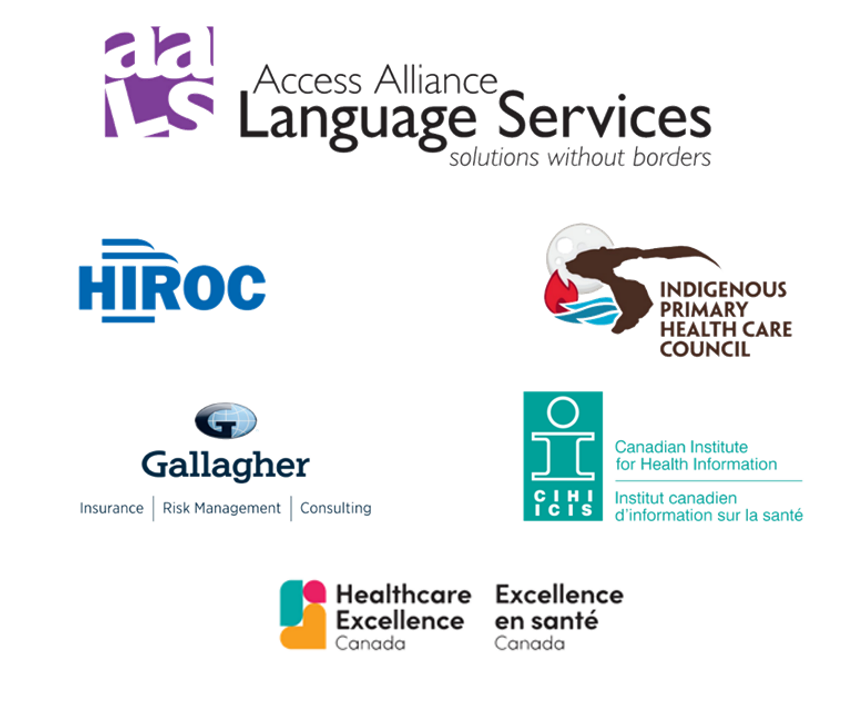
A thank you to our sponsors
With everyone feeling refreshed and limber, Michelle and Liben transitioned into thanking the sponsors who made the conference possible. They acknowledged Access Alliance Language Services, the Indigenous Primary Health Care Council, HIROC, Canadian Institute for Health Information, Gallagher Benefit Services, and Healthcare Excellence Canada for their ongoing support. “We could not have put on this amazing conference without your tremendous support”.
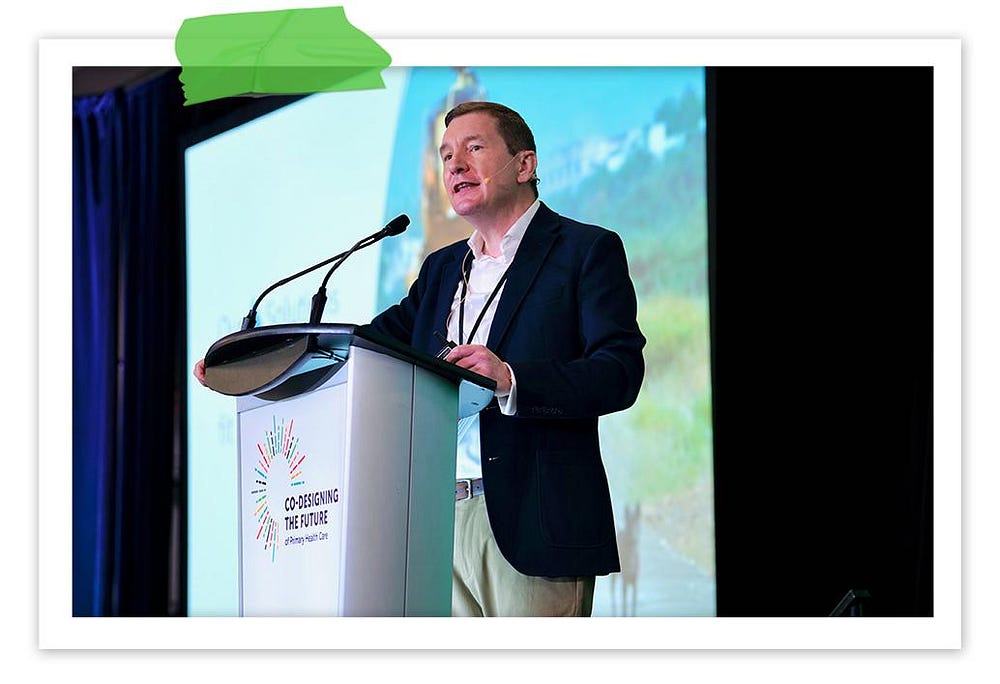
Plenary 4: Role of Community in Integrated Care
Introducing the final plenary speaker, Cormac Russell, Michelle painted a picture of his impactful work with the Asset-Based Community Development (ABCD) Institute. Liben described Cormac as a “social explorer” whose work empowers communities to embrace asset-based approaches and foster vibrant civic life. “We’re very excited to have Cormac here with us this afternoon to help pull together a lot of the concepts we’ve been engaged with at this conference,” he said, inviting Cormac to the stage.
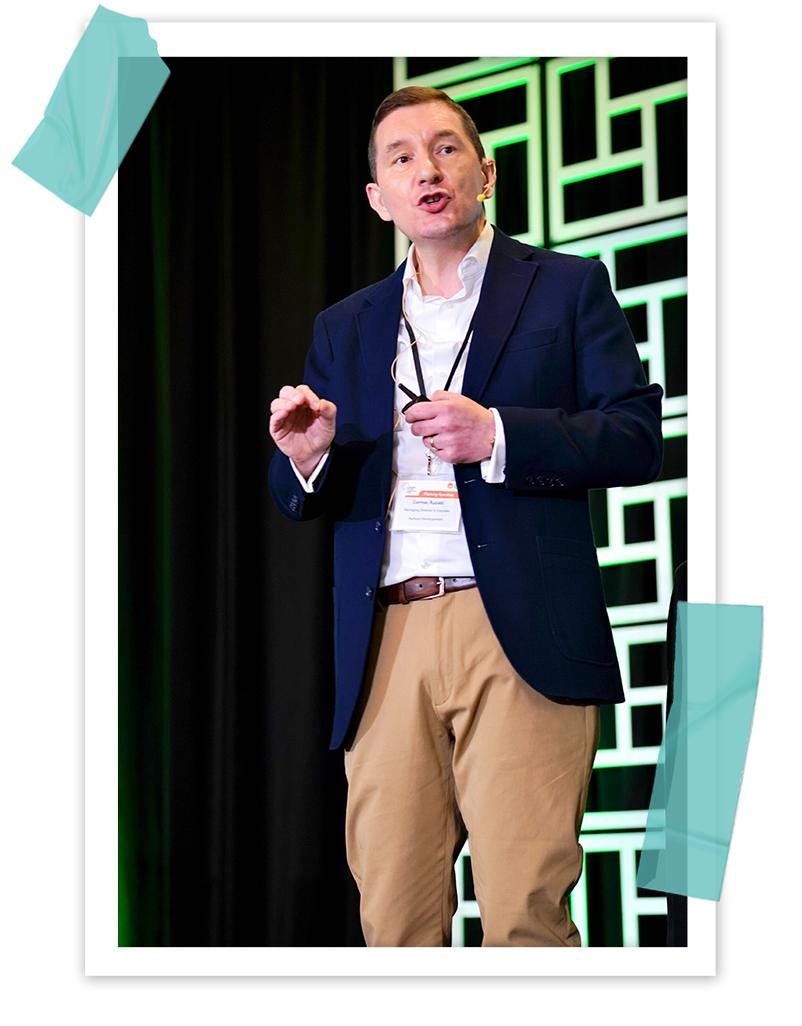

Cormac began his keynote by highlighting a fundamental issue in healthcare: our solutions are often not fit for purpose. He called for a paradigm shift from “Wellbeing I,” a traditional, top-down approach, to “Wellbeing II,” a community-driven, inclusive model. “We need to go from Wellbeing I to Wellbeing II: First By the People; and With the People & then For the People, but not To the People,” he explained. Cormac stressed that while Wellbeing I has reached the limits of its capacities, Wellbeing II must be foregrounded and considered primary, with Wellbeing I becoming supplementary.
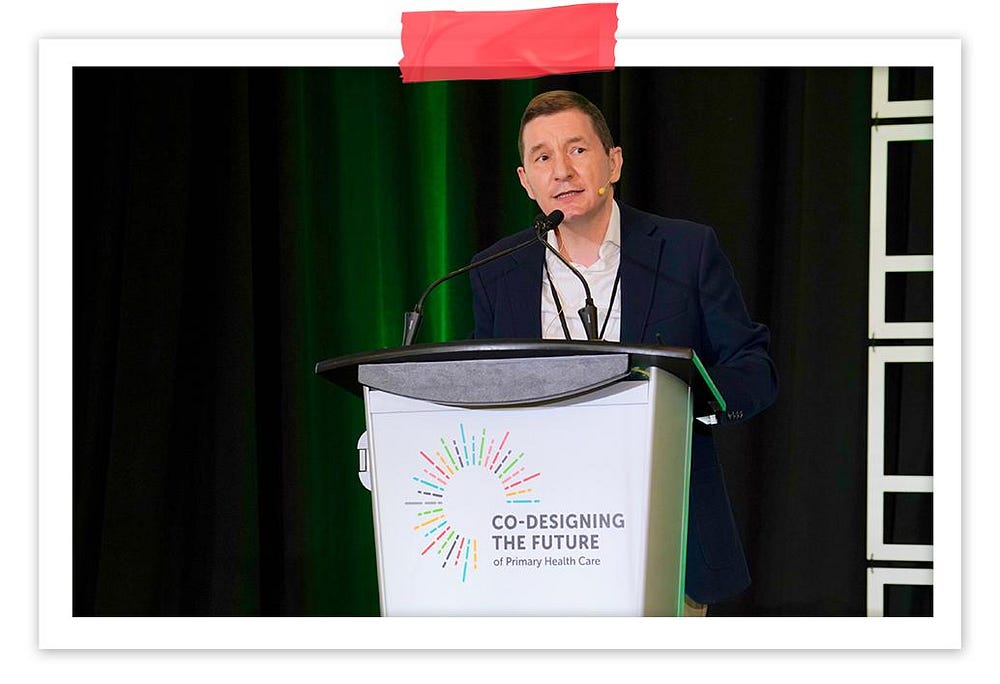
Diving deeper into the Wellbeing II approach, Cormac outlined a clear solution pathway. “Enable people and their communities to feel valued and valuable,” he urged, emphasizing the importance of starting with what’s strong and local. “There can be no wellness without justice and equity,” he declared, underscoring the need for fairness as a foundation for health. Cormac illustrated this with the example of Singapore’s Wellbeing Kampungs, communities designed to foster holistic health by integrating social, economic, and environmental factors.
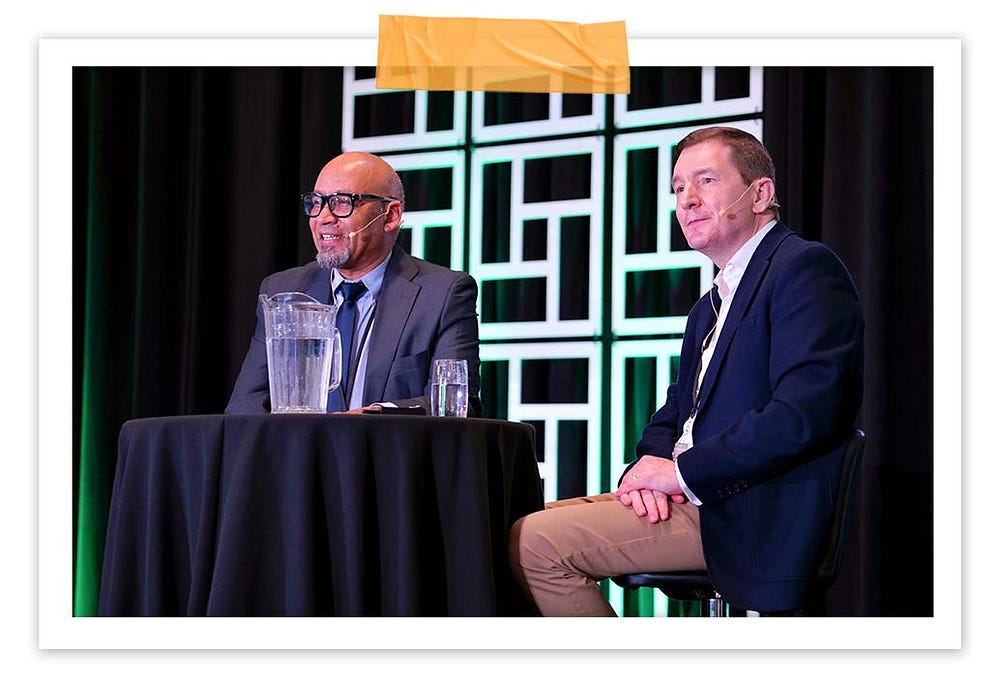
Cormac’s keynote also outlined seven essential functions of a healthy community: enabling health, ensuring security, stewarding ecology, shaping local economies, contributing to local food production, raising children, and co-creating care. He emphasized that these functions must be co-created with the community to be effective and sustainable. “Start With What’s Strong, Not With What’s Wrong,” he repeated, driving home the need to focus on existing community assets rather than deficits.
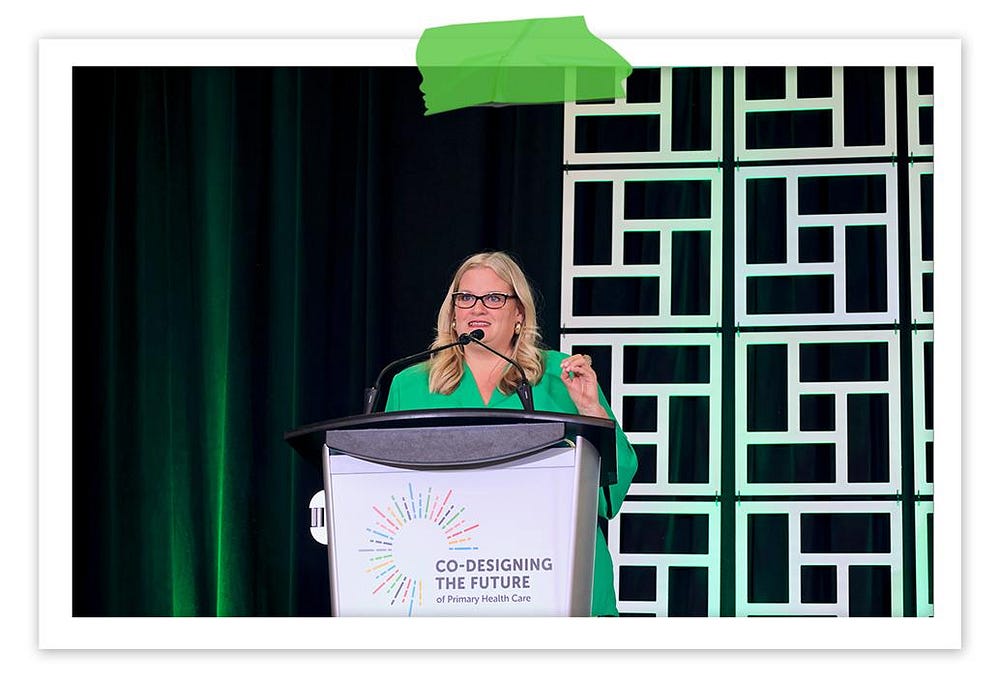

Closing notes
Sarah Hobbs, CEO of the Alliance, then took the stage for closing remarks. She thanked everyone for their participation and encouraged them to provide feedback to help improve future conferences. “Your presence and engagement over the last two days on health equity and shaping the future of primary health care in Ontario energize this entire sector”, she said. She also encouraged us to take the ideas and confidence we gained from the conference back to our organizations, regional networks, local OHT tables, and beyond.
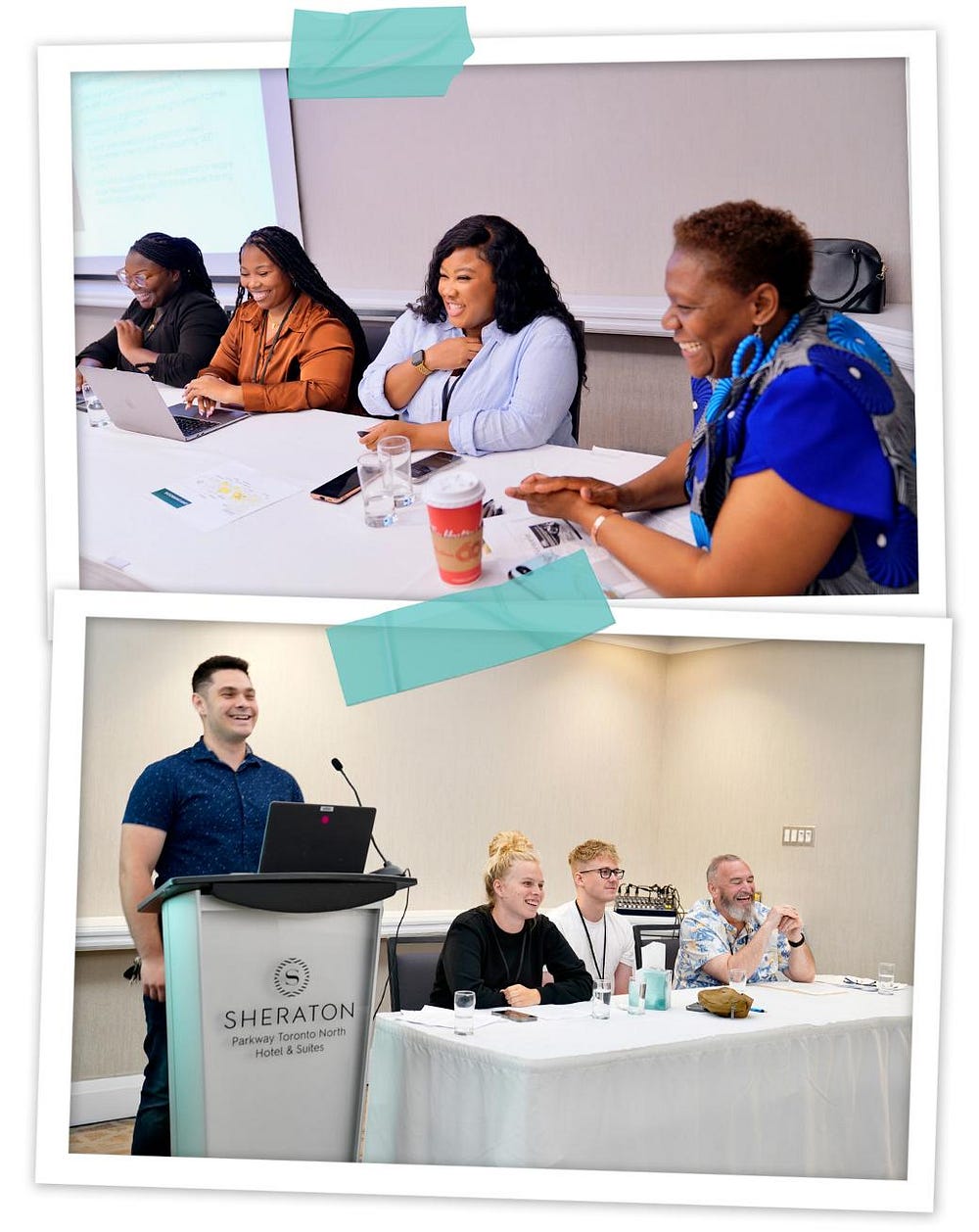
Sarah extended heartfelt thanks to all those who prepared and presented the learning sessions and poster boards, acknowledging their critical role in the success of the conference. By sharing their expertise, research, and innovative ideas, they not only enriched the knowledge base of the conference but also fueled the ongoing conversation about health equity and community well-being.
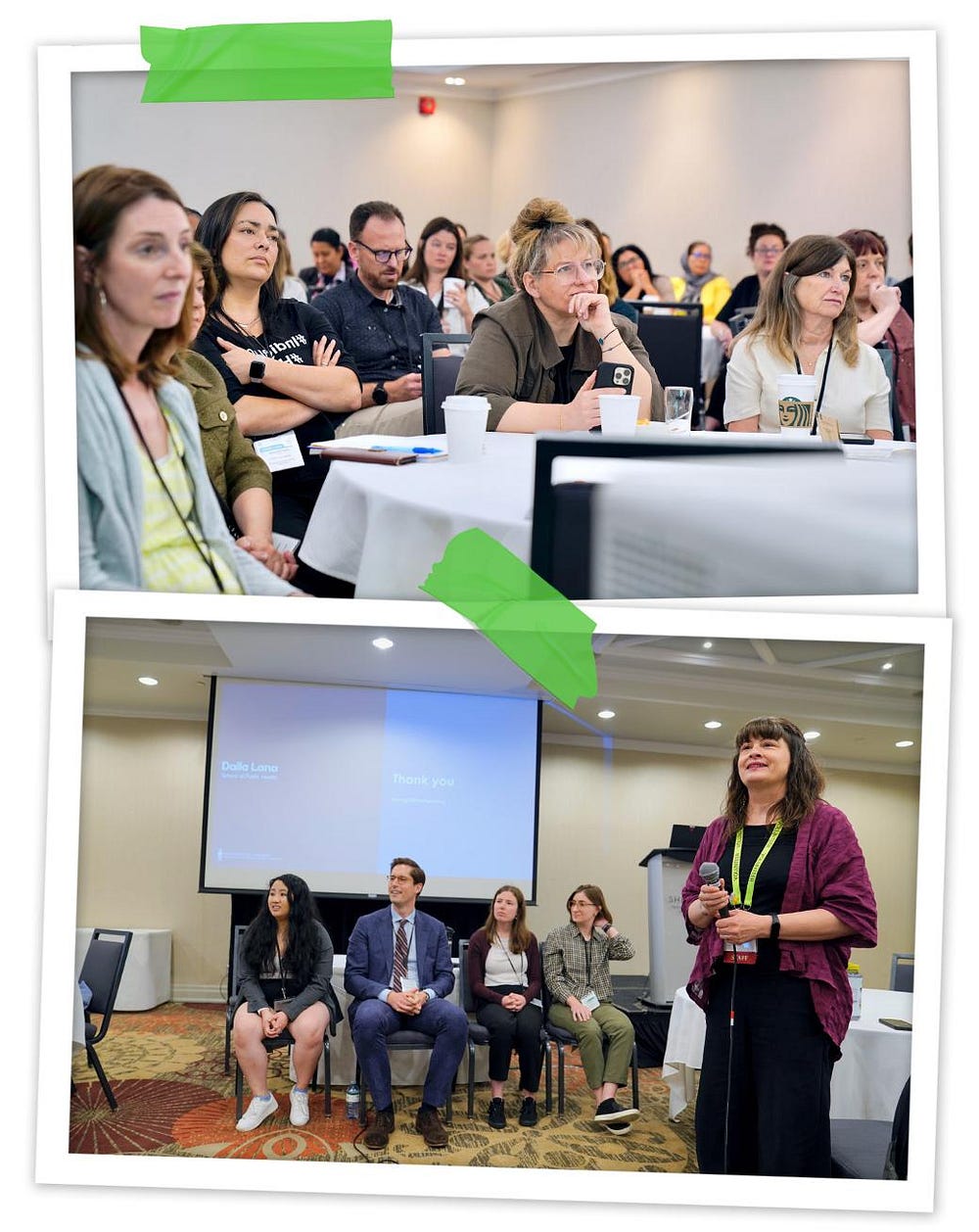
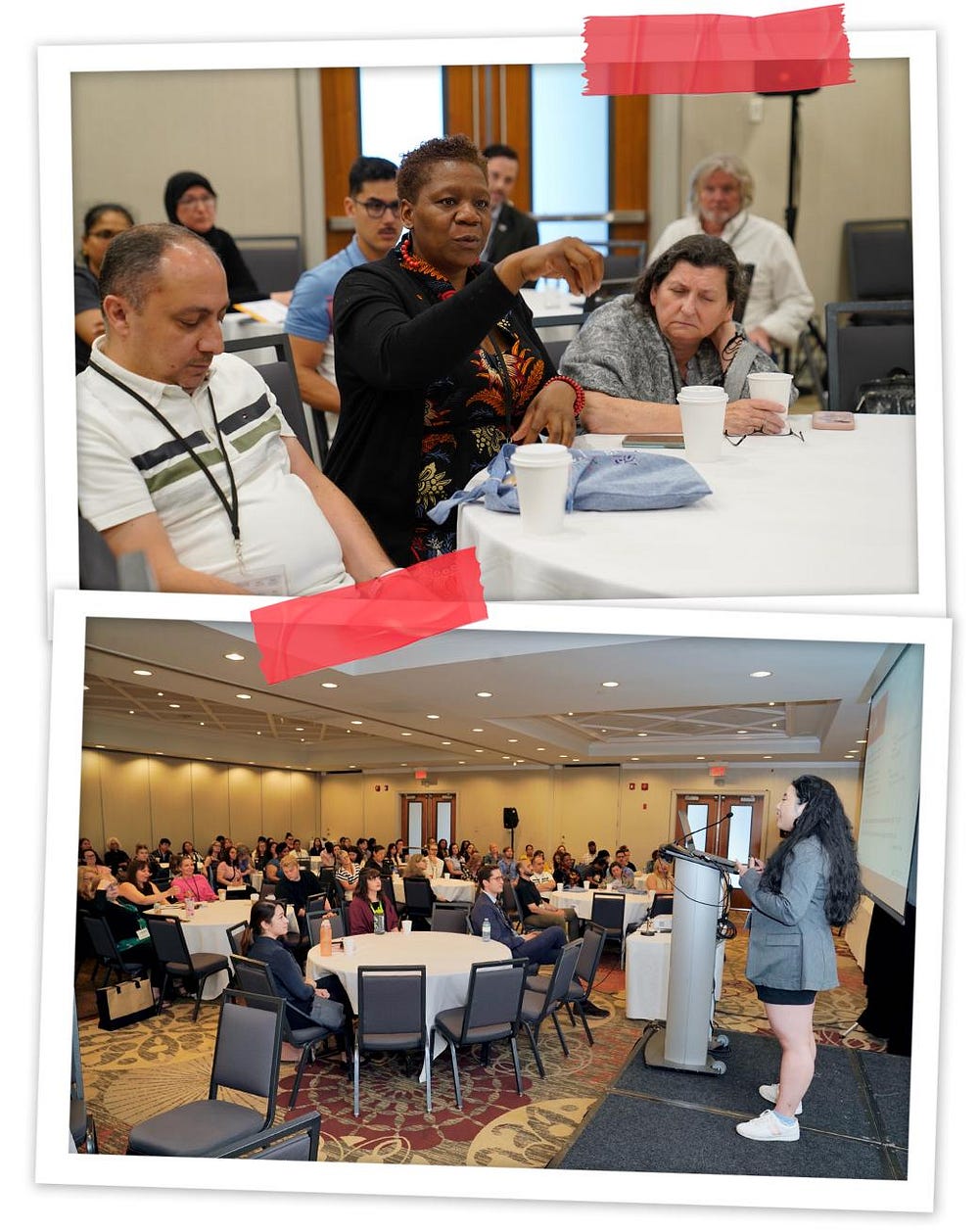
Photo Gallery
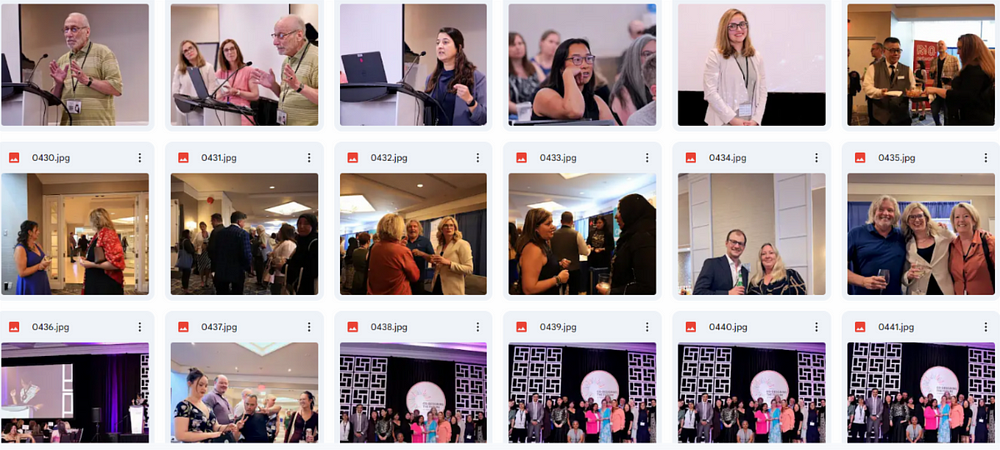
Access the rest of the photos using this link. The gallery has 748 photos taken by our skillful photographers Christian Peña and Zara Dorafshab. Please feel free to use your photos in your communications.

Inside the Photo Gallery to the top-right, click the button above to see it in Grid layout instead of a list.
# Conference Program:

#
# Download the Conference Program here (PDF - 1.9 Mb) |
# Téléchargez le Programme du Congrès ici (PDF - 1.9 Mb) |
Tuesday, June 4, 2024:
| 10:30 AM | 3:30 PM | Rural Remote Northern Symposium |
| 6:00 PM | 07:30 PM | Alliance AGM |
Wednesday, June 5, 2024:
| 7:00 AM | Registration opens | |
| 7:30 AM | 8:30 AM | Exhibit Hall/Breakfast Buffet |
| 8:30 AM | 09:00 AM | Welcome and introductions |
| 9:00 AM | 10:25 AM |
Plenary 1 - By the Water: Exploring Indigenous Health in relation to Environment With Autumn Peltier, moderated by Marlon Cole |
| 10:25 AM | 11:00 AM | Poster Board Reception & Exhibitor Break |
| 11:00 AM | 12:00 PM |
Morning Learning Sessions:
|
| 12:00 PM | 1:00 PM | Lunch and Exhibition Hall |
| 1:00 PM | 2:10 PM |
Plenary 2 - Futurist Perspectives on Health, Mental Health and AI With Jaky Kueper, and Azza Eissa, moderated by Taryn Rennicks |
| 2:10 PM | 2:30 PM | Awards Presentation |
| 2:30 PM | 3:00 PM | Poster Board Reception & Exhibitor Break |
| 3:00 PM | 4:00 PM |
Afternoon Learning Sessions:
|
| 4:00 PM | 4:45 PM | Networking & Free time |
| 4:45 PM | 5:30 PM | Reception with Cash Bar & snacks |
| 5:30 PM | 7:30 PM | Transformative Change Awards Gala |
| 7:30 PM | 8:45 PM | Dinner service |
| 8:45 PM | 11:30 PM | DJ & Entertainment |
Thursday, June 6, 2024:
| 7:00 AM | Registration opens | |
| 7:30 AM | 8:30 AM | Exhibition Hall / Breakfast |
| 8:30 AM | 9:50 AM |
Plenary 3 - Impact of Climate Change on Equity-Deserving Communities Keynote speaker: Dr Mustafa Santiago Ali |
| 10:00 AM | 10:30 AM | Poster Board Reception & Exhibitor Break |
| 10:30 AM | 11:30 AM |
Morning Learning Sessions:
|
| 11:30 AM | 12:30 PM | Lunch & Exhibit Hall |
| 12:30 PM | 1:30 PM |
Afternoon Learning Sessions:
|
| 1:45 PM | 2:55 PM |
Plenary 4 - Role of Community in Integrated Care Keynote speaker: Cormac Russell |
| 2:55 PM | 3:10 PM | Draw for Raffle |
# Plenary Sessions:
|
Plenary 1 - By the Water: Exploring Indigenous Health in relation to Environment This fireside chat between Autumn Peltier, a renowned Indigenous rights and Water activist, and Marlon Cole, Director, IT/IM and Communications at the Indigenous Primary Health Care Council, will discuss pressing topics about Indigenous health in relation to the environment as well as Autumn’s experience advocating for Indigenous rights |
 Autumn Peltier Moderated by Marlon Cole - Director of IT/IM and Communications at IPHCC |
Bio: Autumn Peltier's journey for justice began making waves globally when, at just 13 years old, she boldly addressed the world at a UN General Assembly about water issues impacting her community and her wish to preserve the future of Indigenous communities. Since then, her continuous dedication to advocacy has earned her numerous accolades, including the Sovereign Medal of Exceptional Volunteerism from the Governor-General of Canada and the Lieutenant Governor of Ontario. She has been a prominent speaker at the World Economic Forum, a four-time nominee for the International Children’s Peace Prize, and was featured in Maclean’s Top 50 Canadian Power List in 2021. In 2022, she was awarded an Honorary Doctorate from Royal Roads University, the Daniel G. Hill Award from the Ontario Human Rights Commission, and the Emerging Canadian Leader Award from the Public Policy Forum. |
|
Plenary 2 - Futurist Perspectives on Health, Mental Health and AI The second plenary session will be co-presented by two experts on the current and future uses of AI and technology in enhancing primary health care, with a focus on marginalized populations, ethics and, equity. It will feature Ph.D. Jaky Kueper, Sr. Research Epidemiologist, and Ph.D. Azza Eissa, Clinician Scholar at the University of Toronto. |
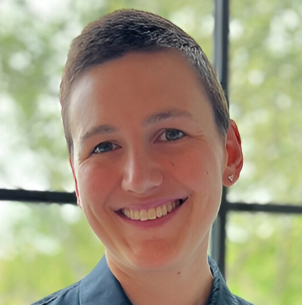 Dr. Jacqueline (Jaky) Kueper,  |
Bio: Dr. Jacqueline (Jaky) Kueper, Senior Research Epidemiologist at the Digital Trials Center, Scripps Research Translational Institute, holds the first Ph.D. in Epidemiology and Computer Science from Western University, acknowledged with the Governor General’s Academic Gold Medal. Engaged in AI for health initiatives, she is a current NAPCRG Phillips Futures Fellow and previous CFPC-AMS TechForward Fellow, and focuses on integrating epidemiology and machine learning to leverage value from everyday data for positive, equitable impact on health and wellbeing. Dr. Azza Eissa, MD, PhD, has joined the Institute for Better Health at Trillium Health Partners as a Primary Care Clinician Scientist. She has a multidisciplinary clinical and research background, with an undergraduate degree in Biochemistry with distinction from Queen’s University, followed by a PhD in Laboratory Medicine & Pathobiology, medical school and family medicine residency all at the University of Toronto. Dr. Eissa recently completed the Clinician Scholar program at the University of Toronto Department of Family and Community Medicine. She is interested in advancing primary care research with a focus on social determinants of health, ethical considerations of AI applications, health equity, early detection and prevention, and pragmatic trials involving patients living with chronic diseases. Dr. Eissa is committed to improving health care delivery and building a learning health system that supports comprehensive primary care and better health for all. |
|
Plenary 3 - Impact of Climate Change on Equity-Deserving Communities This Keynote presentation with Dr. Mustafa Santiago Ali will delve into pressing topics such as environmental justice, and the intricate connections between environmental impacts and the health system. |
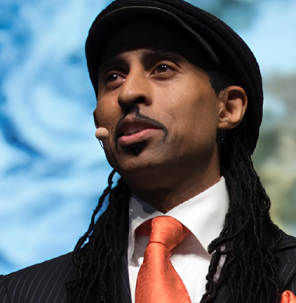 Dr Mustafa Santiago Ali |
Bio: Dr. Mustafa Santiago Ali is the CEO of Revitalization Strategies, the Executive Vice President of Conservation & Justice for the National Wildlife Federation (NWF), the former Interim Chief of Programs at the Union of Concerned Scientists (UCS), and an instructor at the American University at Washington DC. He is not only a distinguished thought leader and activist, but also a fervent champion of environmental justice, public health, resource equity, and political empowerment for marginalized communities. With over two decades of experience, Dr. Ali has dedicated his career to bringing about positive change for communities often overlooked and underserved. His expertise spans a multitude of social justice issues, with a particular focus on revitalizing vulnerable communities and advocating for environmental, health, and economic justice. His expertise and advocacy have garnered widespread recognition, with appearances on major television networks. Dr. Ali’s insights have also been featured in over 250 news publications, showcasing his influence and dedication to driving meaningful change. |
|
Plenary 4 - Role of Community in Integrated Care The fourth and last plenary will take the form of a Keynote presentation by the renowned speaker and author Cormac Russell. In this session, we’ll explore the intersection of healthcare and community well-being, with a particular focus on the determinants of health, including social and community factors. Drawing from his extensive experience working with healthcare institutions globally, Cormac will share invaluable lessons and real-world examples of implementing ABCD (Asset-Based Community Development) in healthcare settings. ABCD, one of the concepts Cormac will delve into during our plenary, is a transformative framework that emphasizes the strengths and assets within communities to drive sustainable development. Through his engaging presentations and practical insights, Cormac brings ABCD to life, showcasing its relevance and impact on various sectors. |
 Cormac Russell |
Bio: Cormac Russell, a social explorer, author, and renowned speaker is the Founding Director of Nurture Development and a member of the Asset-Based Community Development (ABCD) Institute, at DePaul University, Chicago. With over 25 years of experience, Cormac has made a significant impact across 35 countries worldwide. His work focuses on empowering communities and organizations to embrace asset-based approaches, shifting from technocratic governance to fostering vibrant civic life. He has trained communities, agencies, NGOs and governments in ABCD and other community-based approaches in Africa, Asia, Australia/ Oceania, Europe and North America. His most recent books are The Connected CommunityDiscovering the Health, Wealth, and Power of Neighborhoods (Coauthor John McKnight); Berrett-Koehler Publishers, 2022, and Rekindling Democracy – A Professional’s Guide to Working in Citizen Space; Cascade Books, 2020. |
# Learning Sessions:
The program for Learning Sessions is as follows:
June 5 (Wednesday Morning):
-
Panel 1: Refugee Health Integrated Care Teams (by Community Healthcaring Kitchener-Waterloo)
-
Description:
The Refugee Health Integrated Care Team (RH ICT) helps refugee patients transition from temporary to permanent primary care, supported by an interdisciplinary team funded by our local Ontario Health Team (KW4 OHT). Goals include transitioning 300 patients in year 1, improving access to community resources, and aiding primary care practices in accepting refugees. Launched in January 2022 during the Omicron wave, the program concluded funding in January 2023, with some components continuing into Spring 2023 through external and in-kind support.
Session objectives and learning outcomes:
- Transition 300 complex-stable refugee patients to permanent non-team-based primary care
- Utilize a multi-disciplinary/inter-professional team approach in supporting patients and non-team-based primary care providers
Presenters:
- Tara Groves-Taylor
CEO
- Wajma Attayi
Director, Primary Care
- Mayada Abou Warda
Manager, Primary Care
-
Workshop 1: Ask Me Anything with Autumn Peltier
-
Autumn Peltier is an Anishinaabe Indigenous rights advocate from the Wiikwemkoong First Nation on Manitoulin Island, Ontario, Canada. She was named Chief Water Commissioner for the Anishinabek Nation in 2019. In 2018, at the age of thirteen, Peltier addressed world leaders at the United Nations General Assembly on the issue of water protection.
-
Workshop 2: Party n Play/ Chemsex: Pleasure, intimacy, mental health, resilience navigating the Zones of chemsex use by gbMSM (by Gay Men's Sexual Health Alliance)
-
Description:
Party n Play (PnP) is a phenomenon of the sexualized use of recreational substances, depressants and stimulants, injecting drug use by gay, bisexual, and men who have sex with men. We explore four Zones of Engagement in PnP to assist clinicians and clients in understanding the client’s relationship with PnP.
Session objectives and learning outcomes:
- Demonstrate knowledge of the biopsychosocial context of PnP/Chemsex in the gbMSM community
- Practice a harm reduction approach before, during and after to substance use in the context of sex
- Develop competencies in the four Zones for cultural humility, cultural safety, and clinical care
Presenters:
-
Devan Nambiar
Manager of Capacity Building & Talent Development
-
Jordan Bond -Gorr
Coordinator PnP & Chemsex Initiatives
-
Workshop 3: Advocating for mental wellness through creating culturally safe spaces and building entrepreneurship skills to empower Black Youth (by Hamilton Urban Core CHC, Rexdale CHC, and TAIBU CHC)
-
Description:
The From School to Success Pipeline Project (FSSP), led by TAIBU Community Health Centre, supports Black youth by providing cultural services, improving their navigation abilities, and confronting anti-black racism. Partnering with organizations like Hamilton Urban Core and Rexdale Community Health Centres, they collaborate with institutions, families, and youth to develop strategies, guided by an external evaluator.
Session objectives and learning outcomes:
- Increased understanding of the importance of culturally safe spaces
- Enhanced knowledge of the intersectionality of Black identity, entrepreneurship, and mental wellness
- Proficiency in implementing co-designed initiatives for community empowerment
Presenters:
- Patience Simbanegavi
Case Manager of SAPACCY Program (Black Health)
- Cori Blake
Manager, Youth and Family Services
- Ronaye Chester
Program Facilitator of L.E.A.R.N/FSSP
- Chanelle Perrier-Telemaque
From School to Success Pipeline Project Coordinator
-
Workshop 4: Primary healthcare and mental health and addiction services for the Francophone population (in French/en Français)
-
Description:
This learning session will provide an overview of two specific online modules of the active offer training for the primary care and mental health and addiction sectors. It will offer strategies to ensure services that are equitable and culturally adapted for Francophones.
Session objectives and learning outcomes:
- Provide tools for offering services and programs tailored to the Francophone clientele in the fields of primary care and mental health and addiction services.
- Explore strategies to ensure an active offer of health services in French.
- Implement solutions based on best practices.
- Recognition of the importance of French-language health services in both priority areas
- Better understanding of the specific needs of the Francophone clientele
- Development of specialized services and programs that meet the linguistic and cultural needs of the Francophone clientele
- Improvement of communication strategies to effectively engage and serve the Francophone clientele
Presenter:
Sylvie Sylvestre Community Planning and Engagement Officer
Réseau du mieux-être francophone du Nord de l’Ontario
Download the full description of the session here
-
Workshop 5: The PLUG Project: Addressing Disproportionate Suspensions and Expulsions for Black Students (by TAIBU CHC)
-
Description:
The PLUG Project prioritizes violence prevention and conflict mediation, with a focus on advocating for families. Workshops equip Black and marginalized students with skills like conflict resolution. Specialized parent workshops guide families in navigating children's rights within the school board and addressing anti-Black racism. The project aims to enhance student success through robust family engagement.
Session objectives and learning outcomes:
- Gain insights into the challenges faced by Black students within the education system, including anti-Black racism, and explore strategies to address these issues.
- Gain insights into the role of family engagement in the success of the PLUG Project, drawing lessons from case studies that highlight effective collaboration between parents, students, and educators.
- Analyze successful case studies of the PLUG Project, exploring how violence prevention and conflict mediation strategies positively impacted student outcomes, especially for Black and marginalized students.
Presenters:
- Amna Iqbal
Research and Policy Analyst
- Liben Gebremikael
CEO
-
Spotlight 1: Equity in Health Care and Support for Equity-Deserving Groups (four 10-minute presentations):
-
Presentation 1-1: Housing is Healthcare: A story of Collective Impact
Description:
Guelph CHC partnered with Kindle Communities and Stonehenge Therapeutic Community on the 10 Shelldale Permanent Supportive Housing Program. We worked from a collective impact model, where each partner brought their unique skills and contributions to the table to create the biggest impact. We are creating a new model of care for people that integrates health and housing support.
Presenters:
Melissa Kwiatkowski
CEO
Kristin Kerr CEO Stonehenge Therapeutic Community Download the full description of the session here
Presentation 1-2: Co-design for integrated healthcare for people experiencing homelessness
Description:
A Program Co-Design Table led by regional housing made up of health, housing, and social service providers collaborated to develop an integrated, primary care service for people experiencing homelessness. The co-design process will highlight strategies and tools for effective processes and collaboration, incorporating insights from people with lived experiences and subject matter experts.
Presenters:
- Lina Sherazy
Specialist, Housing Innovation and Program Design
Download the full description of the session here
Presentation 1-3: A Brighter Future for Primary Health Care Access for Seasonal Agricultural Workers
Description:
Quest Community Health Centre’s Seasonal Agricultural Worker Health Program (SAWHP) serves seasonal agricultural workers (SAW) in rural Niagara. This presentation will outline the unique experiences of SAWs in accessing health care, the SAWHP model of care and services, how evidence and research support the program, and the lived experiences of the clients SAWHP serves.
Presenters:
-
Jesslyn Froese
Outreach RN
-
Moises Vasquez
Community Health Worker
Download the full description of the session here
Presentation 1-4: Nurse Practitioner and Community Paramedic Collaboration: Serving 70+ unattached seniors in the community
Description:
This presentation will aim to inform the audience about how the nurse practitioner working in a Community Health Centre and Community Paramedic collaborative partnership has been effective in providing primary care to seniors 70+ years old and unattached. Through virtual means, the NP, the CP and the patient communicate and address primary care issues where there is a barrier due to mobility issues, lack of transportation and lack of physical space.
Presenters:
- Jocelyn Agravante
Nurse Practitioner
- Jeremie Hurtubise
Superintendent of Community Paramedicine and Performance Standards
-
Governance 1: Co-designing Your Government Relations and Advocacy Strategy (by Alliance for Healthier Communities)
-
Boards of community-governed primary health care organizations have an important role to play in influencing decision-makers and advancing change at the local and provincial levels. Join us for this interactive session that will focus on developing, enhancing and implementing an effective advocacy strategy and building strong relations with elected government officials as well as explore the different ways Boards can get involved. The collaborative session will offer practical tips and resources as well as opportunities for sharing experiences and learnings.
Presenter:
Zakaria Abdulle Government Relations Lead
Alliance for Healthier Communities
June 5 (Wednesday Afternoon):
-
Thematic Session 1: Friends of Francophone CHC (en Français / in French)
-
A learning session on the support and advocacy for sustainability of Francophone (or bilingual) CHCs in Ontario.
Facilitator:
Jean-Louis Tanguay Board Member
-
Panel 2: Crystal Clear: The Power of Catalyst - An Innovative, Contingency Management Community for Methamphetamine Recovery (by Street Health Centre-Kingston Community Health Centres, Addictions and Mental Health - Kingston, Frontenac, Lennox & Addington, and Providence Care)
-
Description:
People who use crystal methamphetamine are often met with persistent barriers to housing, health care and social services. Join us as we discuss Catalyst, a client-informed, community-building twist on traditional contingency management programs. Catalyst integrates several sectors including nursing, counselling, community support workers, occupational therapy, and stabilization housing.
Session objectives and learning outcomes:
- Learn about traditional contingency management and how expanding on this model with the help of collaborators from various sectors can improve overall health and well-being.
- Learn about the roles that each of our collaborators play in delivering client-informed, life-changing programming.
- Learn about the successes and challenges in developing and delivering this program.
Presenters:
- Meredith Mackenzie
Medical Director
- Laurie Barkun
Registered Nurse
- Clark Heath
Community Support Workers
- Sarah Den Ouden
Community Support Workers
- Christina Moeys
Addictions Counselor
Addictions and Mental Health - Kingston, Frontenac, Lennox & Addington
- Meaghan O'Connor
Occupational Therapist
-
Workshop 6: Co-Design of Artificial Intelligence-Enabled Decision Support Tools
-
This workshop focuses on deriving value from electronic medical record data with artificial intelligence-enabled decision support tools. Participants will learn about an example tool in-development with and for Community Health Centres before moving into interactive activities to work together to identify new tool ideas and key considerations for positive impact.
Session objectives and learning outcomes:
- To understand the basics of artificial intelligence and decision support tools.
- To identify meaningful challenges in primary health care that can be supported through artificial intelligence and electronic medical record-based decision support tools.
- To identify challenges and opportunities for integrating decision support tools into everyday practice to support effective, efficient, and equitable care delivery.
Presenters:
- Jaky Kueper
Sr. Research Epidemiologist
- Sandra Fitzpatrick
Regional Facilitator, Toronto Diabetes Care Connect
- Dan Lizotte
Associate Professor, Department of Computer Science and Department of Epidemiology and Biostatistics Western University
-
Workshop 7: Artificial Intelligence (AI), primary health care, and privacy - finding the balance (by Kingston CHC, RFLA Allied Health Team, and Alliance for Healthier Communities)
-
Description:
Behind the doors of a primary health care clinic - a medical scribe solution creates EMR-ready notes, ChatGPT writes sick notes, and an intake questionnaire is generated instantly. These examples of artificial intelligence are forcing us to examine potential privacy issues and to carefully consider AI needs for the future.
Session objectives and learning outcomes:
- Examine the extent to which AI has been already applied in primary health care.
- Understand the privacy implications of using AI in primary care service delivery.
- Provide guidelines on privacy considerations for the use of AI-based technologies in primary health care.
Presenters:
- Jennifer Snyder
Privacy Officer and Digital Health Connector
- Simeon Kanev
Privacy Officer and Business Lead
-
Workshop 8: Building Resilient Healthcare Systems: The Role of Essential Care Partners (by The Ontario Caregiver Organization)
-
Description:
The Essential Care Partner (ECP) Support Hub supports healthcare organizations to implement and adopt programs and practices that formally identify, support, and include caregivers as part of the care team. This presentation shares insights and strategies in implementing ECP programs and leading practices, offering a blueprint for caregiver-inclusive healthcare culture, and addressing barriers through facilitated discussion.
Session objectives and learning outcomes:
- Understand the evidence that demonstrates the importance of including caregivers as essential care partners in primary care settings, including better care quality, patient outcomes, cultural safety, and improved working conditions for teams.
- Learn practical tips and strategies from the Essential Care Partner (ECP) Support Hub that can be applied to promote caregiver inclusion in primary care settings throughout Ontario.
- Learn about the barriers caregivers face when accessing services and ways primary care providers can support caregiver well-being through referral pathways alongside the Ontario Caregiver Organization.
Presenters:
- Alison Kilbourn
Manager, Essential Care Partner Support Hub
- Husayn Marani
Caregiver
-
Workshop 9: Digital Transformation through robotics in Primary Health Care
-
Presenter:
- Marlon Cole
Director of Information Management & Communication
-
Spotlight 2: Innovations in Health Care Delivery and Technology (four 10-minute presentations):
-
Presentation 2-1: PINK DIFFERENT: A Fun and Fresh Idea to Improve Breast Cancer Screening in Vulnerable Women
Description:
Trauma, homelessness, poverty, mental illness, and substance use are barriers for women accessing traditional breast cancer screening. A Community Health Centre (CHC) engaged a hospital to co-host a “Mammogram Party” for vulnerable women. This unique trauma-informed approach successfully engaged five women in breast cancer screening with overwhelmingly positive client evaluations.
Presenters:
- Rebekah M. Barrett
Primary Care Nurse Practitioner
- Giordana Humphries
Sex Worker Education and Empowerment Program Coordinator
Download the full description of the session here
Presentation 2-2: Advancing an equitable HIV testing response through updated HIV testing guidelines: the role of community health centres
Description:
In 2020 an estimated 2561 people living with HIV were not aware of their HIV status. Updated HIV testing guidelines can support health care providers in community health centres in reaching those affected by HIV. This session will support uptake of the guidelines and efforts to address HIV in Ontario.
Presenters:
- Patrick O'Byrne
Professor & Nurse Practitioner
Download the full description of the session here
Presentation 2-3: Partnering with clients and communities to co-design equitable access to smoking cessation and lung cancer screening
Description:
To improve equity in lung cancer care, primary care providers need to provide safe and timely referrals to lung cancer screening for people experiencing stigma and discrimination. The purpose of our study was to promote equitable access to lung cancer screening by co-designing an educational intervention (an e-learning module) that will build knowledge and skills in primary care providers to deliver equity-oriented lung cancer screening.
Presenters:
- Dr. Ambreen Sayani
Scientist
- Howard Freedman
Patient-Partner
Download the full description of the session here
Presentation 2-4: Journey mapping of an unattached patient’s primary care visit
Description:
This qualitative study aims to understand the current primary care experience from the unattached community members’ perspective using journey mapping, a co-design and engagement tool. The results are being incorporated into an evidence-based Health Home and Neighborhood model in the FLA OHT region, prioritizing rapid improvement opportunities.
Presenters:
- Anna Chavlovski
Family physician, Primary Care Lead
Loyalist family health team, Frontenac, Lennox & Addington Ontario Health Team
-
Governance 2: Navigating the Future: AI Governance Strategies for Organizational Success
-
Description:
Artificial intelligence (AI) is rapidly transforming healthcare, and primary care is no exception. With countless AI tools emerging, how can your organization stay ahead of the curve? In this session, we delve into the vital landscape of AI governance and illuminate key considerations for policy development. We will explore the critical governance and safeguards needed to harness the power of AI and thrive in this exciting new era.
Session objectives and learning outcomes:
- Understanding Ethical Challenges with AI
- AI Policy Development
- Risks and Opportunities to implementing AI solutions
Presenters:
-
Marc Gordon
Director of Information Management
June 6 (Thursday Morning):
-
Panel 3: Loose Lips Sink Ships: Collaborating to Steer Interpreters Toward Better PHIPA Compliance (by Somerset West CHC, Access Alliance Multicultural Health & Community Services, and Alliance for Healthier Communities)
-
Description:
Trust impacts health outcomes. Where we face language barriers, the interpreter is key in fostering that trust relationship. How do we hold interpreters to the same privacy and confidentiality standards expected of providers? This is our co-design journey toward a standardized privacy and confidentiality training module for Community Interpreters.
Session objectives and learning outcomes:
- Implement co-design best practices
- Encourage and support better privacy and security adherence of independent contractors;
- Influence procurement practices when it comes to privacy and security compliance
Presenters:
- Christine Klerian
Program Administrator
- Grace Eagan
Director, Language Services & Digital Strategy
- Simeon Kanev
Privacy Officer and Business Lead
-
Workshop 10: Climate Justice: Healing Our People, Communities, and Our Planet
-
This session will explore the interconnectedness of climate justice, highlighting how addressing climate change can simultaneously heal individuals, strengthen communities, and restore our planet. Through expert talks with Dr. Ali and interactive activities, participants will gain a deeper understanding of climate justice's social, economic, public health and environmental dimensions. Attendees will leave with actionable insights and strategies to advocate for and implement equitable climate solutions in their own communities.
Presenter:
- Mustafa Santiago Ali
CEO
-
Workshop 11: Maximizing Lived and Living Expertise in Healthcare (by Quest CHC and Niagara Helps)
-
Description:
Niagara HELPS is a community partnership between Quest Community Health Centre, Niagara Health and McMaster University. This peer support program employs individuals with lived/living experience who provide support and system navigation for individuals experiencing homelessness who attend the Emergency Departments (ED) at Niagara Health (St. Catharines and Niagara Falls sites).
Session objectives and learning outcomes:
- The importance of leveraging lived/living expertise in healthcare
- Identifying partnerships that reduce reliance on Emergency Department services
- Shifting the focus from “What’s the matter with you?” to “What matters to you?”
Presenters:
- Alex Laugher
Youth Peer Support Worker
- Keanna Schuster
Peer Support Navigator
- Rob Bakker
Peer Support Navigator Quest CHC - Niagara Helps - Scott Cronkwright
Peer Support Navigator Quest CHC - Niagara Helps
-
Workshop 12: Make the Media Work for You: A Best Practices Workshop for Landing Your Messages During Interviews with Journalists (by Alliance for Healthier Communities)
-
Description:
Following up on the success and interest in the 2022 session "Talking to Journalists about Health Equity", which introduced tips and concepts in health equity-focused media relations to better engage with media, both journalists and assignment editors, this session will expand on the training to truly deliver an excellent interview that puts your quotes at the top of any story. We will be joined by 2-3 leaders from the Alliance sector who will speak to their successes (and near misses) when engaging with the media, and there will be a chance to practice your skills with insight from our team during the session.
Session objectives and learning outcomes:
- Increase knowledge of how to hone and deliver messages to media
- Learn do's and don'ts during any interview
- Learn advanced strategies for tailoring your message needs to the storyteller
Presenters:
- Jason Rehel
Public and media relations specialist
- Juanita Lawson
Chief Executive Officer NorWest Community Health Centres - Cheryl Prescod
Executive Director Black Creek Community Health Centre
-
Workshop 13: Rural, Remote, and Northern Workshop
-
Presentations from rural, remote and northern perspectives including: the Centre de santé communautaire du Témiskaming / NorWest CHC research regarding mental health and substance needs for individuals working in the mining and construction industry project, Windsor Essex CHC on the International Agriculture Workers health issues and project, and Indigenous Primary Health Care Council on Indigenous health relating to rural, remote or northern community health.
Presenters:
- Laura Strathdee
Director, Clinical Practice Windsor Essex CHC
- Juanita Lawson
CEO NorWest CHC - Jocelyne Maxwell
Executive Director CSC Temiskaming - Curtis Hildebrandt
Senior Advisor, Health System Strategy IPHCC
-
Spotlight 3: Wholistic Well-being and Social Prescribing (four 10-minute presentations):
-
Presentation 3-1: What Every Clinician Needs to Know About Social Prescribing
Description:
This session tackles challenges Primary Care staff face, like food and housing insecurity, loneliness, and mental health decline. It introduces social prescribing, a concept voted top at the Family Medicine Forum, which shifts focus to patient needs. It explores applying social prescribing in diverse Ontario practice settings, offering practical strategies for addressing social needs in clinical settings.
Presenters:
Dr. Dominik Nowak
President (OMA), Assistant Professor (U of T)
Ontario Medical Association, Women's College Hospital, University of Toronto
Download the full description of the session here
Presentation 3-2:Best Practices and Lessons from the Registered Nurses Association of Ontario
Description:
Quest Community Health Centres experience in maximizing the interdisciplinary teams efforts in measuring health equity by becoming and maintaining a Registered Nurses Association of Ontario (RNAO) Best Practice Spotlight Organization (BPSO) through the implementation of various best practice guidelines including 2SLGBTQI+ Health Equity and Crisis Intervention for Adults Using a Trauma-Informed Approach.
Presenters:
- Ailish Westaway
Health Promoter
- Lauren Fischer
Registered Nurse
Download the full description of the session here
Presentation 3-3: Co-production in social prescribing: A multiple case study in England and three Canadian provinces
Description:
Although social prescribing looks different around the world, there are structural components that are shared, one of them being the concept of co-production. The aim of this research was to understand the role of co-production in social prescribing. A multiple case study was conducted in England and Canada.
Presenters:
- Le-Tien Bhaskar
Health Policy PhD Candidate / Research Assistant
Download the full description of the session here
Presentation 3-4: Understanding the Social Prescribing Needs and Perspectives of Seniors: Results from a Mixed-Methods Study
Description:
This presentation focuses on the role of social prescribing in promoting the wellness of older adults in Canada, leveraging the perspectives of marginalized seniors to ensure that innovative primary and community care initiatives meet their needs.
Presenters:
- Kiffer G. Card
Assistant Professor
-
Governance 3: Board’s Role in Improving Data Collection and Use
-
Collecting socio-demographic and race-based data is essential to our mission of advancing health equity. It provides evidence we need to advocate for clients and community members serve and tailor service delivery to improve care. Boards have an important role to play in stewarding data collection and use. The session will examine Boards’ role in improving collection and use of sociodemographic and race-based data in their organizations, as well as resources available to support them in this work. The session will offer an opportunity to share practices and procedures members have implemented to improve data collection and use in their organizations.
Presenter:
- Jennifer Rayner
Director of Policy and Research
Alliance for Healthier Communities
June 6 (Thursday Afternoon):
-
Thematic Session 2: Black Health Committee Workshop for Black staff and leaders
-
This workshop is intended for Black staff and is centered around the Black Health Strategy implementation and execution phase.
Facilitator:
- Dr. Akeem Stewart
M. D., Provincial Lead Black Health & Wellness
Durham CHC
-
Panel 4: Implementation Research for testing the CANRISK Tool Screening for Diabetes among African, Caribbean, and Black Adolescents (by Access Alliance Multicultural Health and Community Services, Rexdale CHC, TAIBU CHC, and Black Creek CHC)
-
Description:
This collaborative study aimed to update the CANRISK questionnaire to more accurately identify African, Caribbean, and Black Canadians aged 18-39 at risk of diabetes, led by PHAC and conducted at four community health centers in Toronto. Challenges in recruiting healthy adolescents and post-diagnosis communication while maintaining PHI principles will be discussed.
Session objectives and learning outcomes:
- How to advance a meaningful interprofessional collaborative CBR initiative that can integrate clinical and social care to fulfill the gap of a system-level assessment tool (CANRISK)
- How EGAP principles and a peer-researcher model are used effectively to strengthen implementation research and innovation activities conducive to Black Health as a part of the focal point
- Identify strategies that enable the implementation of community diabetes screening programs, overcome recruitment challenges, and streamline secure communication with clients
Presenters:
- Akm Alamgir
Director, Organizational Knowledge & Learning
- Devi Raghunauth
Director, Primary Health Care Services
- Amna Iqbal
Research and Policy Analyst
- Victor Adarquah
Research Coordinator
-
Workshop 14: Community Animation & Asset-Based Community Development (by Cormac Russell)
-
Presenter:
Cormac Russell
-
Workshop 15: Nothing About Us Without Us: Patients with Diverse Lived Experience Need to be Part of your Policy Shaping Team
-
Description:
When people with lived experience (PWLEs) are not included in the decision-making process, in research, and in all other endeavours, it creates an unbalanced approach issues including the failed war on drugs, increased overdose deaths and housing instability, among other issues related to social inequality and marginalization. PWLEs are fundamental partners in co-designing primary health care, and the full participation and equalization of opportunities for PWLEs is necessary for the effective formulation and implementation of strategies to address social issues in Canada.
Panelists with lived experience as patient research partners at the Alliance for Healthier Communities will talk about the value they and other PWLEs bring to the decision-making process and what needs to be in place in order to ensure that your lived-experience partners are properly supported.
Session objectives and learning outcomes:
A deeper appreciation of the value of PWLE as decision-making partners An understanding of how to support the full participation of PWLEs in decision-making.
Presenters:
- Terrie Meehan
Vice Chair
EPIC Client & Community Research Partners Committee
- Kimberly Mitchell
Chair
EPIC Client & Community Research Partners Committee
- Claire Snelgrove
EPIC Client & Community Research Partners Committee
- Madelyn Gold
EPIC Client & Community Research Partners Committee
-
Workshop 16: Addressing Health Inequities in Action-Population Health Cervical Screening (by WellFort Community Health Services, and Rexdale CHC)
-
Description:
Leaders within one OHT in Peel, these two CHC's demonstrated a robust collaborative Quality Improvement project focusing on cervical screening. With one of the lowest rates of cervical screening in the province and a highly diverse community with a lack of access to comprehensive primary care, these partners operated improvements focusing both on internal primary care improvements as well as a whole community population health model.
Session objectives and learning outcomes:
- Share successes and challenges of population health focus
- Review the importance of being data-driven organizations
- Review community-centric practices that support organizational and population health
Presenters:
- Kimberley Floyd
CEO
- Monica Balkaran
Registered Nurse
-
Workshop 17: Legal Problems Harm Health: Learn Legal Help Skills to Improve Health Outcomes (by CLEO - Community Legal Education Ontario, and CALC - Community Advocacy & Legal Centre)
-
Description:
This workshop introduces two initiatives that build skills to address health-harming legal needs. It explores access to justice as a social determinant of health, including how to identify legal aspects of health problems and how to connect community members to low-barrier legal information and support.
Session objectives and learning outcomes:
- Describe how legal issues can negatively affect health and how legal solutions can improve health outcomes
- Understand how collaboration between the health and justice sectors improves health equity and patients’ health outcomes
- Identify sources of reliable legal information, accessible legal services, and training to help address health-harming legal needs
Presenters:
- Helen Anderson
Director, CLEO Connect
- Lisa Turik
Lawyer/Executive Director
-
Spotlight 4: Community-Centered Health Initiatives and Advocacy (four 10-minute presentations):
-
Presentation 4-1: Building Quality Improvement and Data Capacity within the Community Mental Health and Addiction Sector
Description:
The Roadmap to Wellness, launched in March 2020, is Ontario's plan for mental health and addiction services. It focuses on four pillars: improving quality, expanding services, implementing innovation, and enhancing access. Through E-QIP, MHA providers receive training and support to boost quality improvement efforts and data capacity. This presentation highlights QI activities and lessons learned over eight years, identifying opportunities for future advancements in the MHA sector.
Presenters:
- Abel Gebreyesus
QI and Data Coach
Download the full description of the session here
Presentation 4-2: The Systems Navigation Access & Partnership (SNAP) Project: Improving the Healthcare Landscape Across Canada
Description:
The Systems Navigation Access & Partnership (SNAP) project initiated by the Canadian Association of Community Health Centres (CACHC) is supporting CHCs to 1) increase efforts to improve health and social systems navigation access, 2) strengthen Canada’s healthcare landscape, and 3) eliminate health disparities while improving population health outcomes across Canada.
Presenters:
- Ayesha Khan
Knowledge Translation Specialist
- Iwo Effiong
Executive Director
Download the full description of the session here
Presentation 4-3: Bringing primary care to the doorsteps of those in need
Description:
Durham Community Health Centre’s (DCHC) vision for the Integrated Mobile Primary and Allied Care Team (IMPACT) is to operate seven mobile clinics to serve seven priority neighbourhoods in the Durham region, through both in-person and virtual care. The primary goal of this population-based health service model is to enroll a minimum of 17% of Durham's unattached population (44,000 individuals) with a primary care provider within the next two years.
Presenters:
- Ivory Lo
Senior Manager, Integrated Care and Experience
- Alfred Ng
Associate Vice President, Integrated Care and Experience
Download the full description of the session here
Presentation 4-4: Lessons from an AI Tali Transcription journey
Description:
At Centretown CHC in downtown Ottawa, one nurse practitioner and one family doctor, both with diverse comprehensive practices trialled an AI scribe tool. We will discuss our journey with the languages and complexities to help examine where AI can be used in our work
Presenters:
- Alison Eyre
MDCM, CCFP, FCFP Family Physician
-
Governance 4: Boards Legal Responsibilities
-
Board’s primary role is to steer the organization towards a sustainable future by adopting sound, ethical, and legal governance and financial management policies, as well as by making sure the nonprofit has adequate resources to advance its mission. This session will delve into Board’s primary legal responsibilities and typical Board functions as well as explore other considerations, including personal liability of directors and mitigation strategies, to ensure proper oversight and enable the organization to advance its mission.
Presenters:
- Ben Fuhrmann
Corporate Lawyer
# Poster Board Presentations
This year, we have 14 Poster Board presentations ready in a vast and interesting selection of themes and topics:
-
1. Engaging with Everyone Toolkit: Advancing Equity-Focused Patient Partnerships Through Co-Designed Tools (by Women’s College Research Institute, Women’s College Hospital)
-
Description:
Equity Mobilizing Partnerships in Community (EMPaCT) is a co-designed innovation that creates opportunities for inclusive patient partnerships and promotes health equity in tangible ways. EMPaCT has co-created the "Engaging with Everyone Toolkit", a collection of virtual tools for project implementers to adapt to their settings to promote inclusive equity-focused patient engagement.
Poster Board objectives and learning outcomes:
- The attendees will recall the theory-based process of co-creating the EMPaCT "Engaging with Everyone Toolkit"
- The attendees will identify and describe the outputs of the co-designed toolkit within its three sections
- The attendees will summarize EMPaCT’s approach to co-evaluating the outcomes and impact of the toolkit in promoting Inclusion, Diversity, Equity, Accessibility & Allyship (IDEAA) in patient partnerships
Presenters:
- Salva Niwe
Research Student
Women’s College Research Institute, Women’s College Hospital
- Mohaddesa Khawari
Research Assistant
Women’s College Research Institute, Women’s College Hospital
-
2. The Chippewas of Kettle & Stoney Point REACH Quality Improvement Journey (Kettle & Stony Point Health Services)
-
Description:
In 2021, the Chippewas of Kettle & Stony Point First Nation initiated the REACH Quality Improvement (QI) Program, a 24-month virtual series of activities led by a community QI Team. Areas for improvement are identified and prioritized, ideas for change are generated, and Plan-Do-Study-Act (PDSA) cycles test the ideas.
Poster Board objectives and learning outcomes:
- The objective of the session is to share the process and impact of the REACH QI Program in Kettle & Stony Point First Nation. Attendees will learn about Kettle & Stony Point and the REACH quality improvement processes, and hear how the program was received by the community and about its impact.
Presenters:
- Carlene Mennen
Community Health Nurse
- Lori Monague
-
3. Improving Digital and Health Inequalities Faced by Ethnocultural Minorities Through Hybrid Delivery of a Health and Wellness Program for Seniors (by South Riverdale CHC)
-
Description:
Since January 2023, The South Riverdale Community Health Center, the Alzheimer Society of Toronto, the Eastview Neighborhood Community Center, and other community partners have been working collaboratively to deliver health and wellness workshops for seniors from ethnocultural minorities, predominately Chinese-speaking seniors. This hybrid programming combines in-person and virtual programming, with co-facilitators working simultaneously to ensure participants receive the best support. The program aims to promote physical, mental, social, and emotional health while reducing digital and health inequalities.
Poster Board objectives and learning outcomes:
- To gain a better understanding of the digital health program barriers faced by ethnocultural minorities based on lessons learned from the COVID-19 pandemic.
- To learn about the strategies and methods for promoting equity and inclusivity in digital health initiatives.
- To understand the challenges and opportunities of adopting hybrid programming in preparation for future health promotion programs.
Presenters:
- Annie Chung-Hui
Community Dietitian
- Sarpreet Khera
Program Manager
-
4. Urban HOPE-improving access to low-barrier care (by Centretown CHC)
-
Description:
Urban HOPE- comprehensive and multi-disciplinary wraparound health and social services that address the intensifying epidemic of overdose deaths within Ottawa, as well as the disconnect from health services experienced by marginalized populations within the Centretown neighbourhood of Ottawa. Urban HOPE is a cost-effective means of easing the burden of overdose on the healthcare system by involving people with lived and living experience in service delivery.
Poster Board objectives and learning outcomes:
- Participants will observe creative ways to integrate those with lived experience into an overdose prevention program
- Participants will learn about the client benefits of receiving medical care from a multi-disciplinary team
- Participants will learn about creative strategies for client engagement with those who are unhoused or vulnerably housed
Presenters:
- Elizabeth Cain
Nurse Practitioner
- Wendy McKinley
-
5. Ethnic and race-based data collection and use in Primary Health Care: Exploring experiences and perceptions of Black African Immigrants in Ontario (by Queen's University)
-
Description:
Over a third of Black Canadians were born in Africa. While disaggregated race-based data as a critical tool informs and guides future population needs while highlighting how systemic racism impacts Black African immigrants, limited ethnic race-based data impedes the measurement of health inequities and healthcare quality assurance for the population.
Poster Board objectives and learning outcomes:
- An introduction or expanded understanding of Afrocentric approaches to health.
- An enhanced understanding of why using Afrocentric approaches to data collection and use processes matters to this target population.
- Reinforcing the critical roles Primary Health Providers play in advancing health equity for this fast-growing population.
Presenters:
- Vivian Kilanko
PhD Candidate
-
6. Fostering Psychological Safety: Langs' Journey to a Healthier Workplace (by Langs CHC)
-
Description:
Explore Langs' approach to creating a psychologically safe workplace by fostering employee well-being, trust, and leadership development. Learn about our measurable outcomes and gain insights into building resilient and adaptable organizational cultures, with a particular emphasis on engaging leadership for support.
Session objectives and learning outcomes:
- Langs' Social and Wellness Program: Explore Langs' initiatives, events, and impact on employee well-being.
- Top-Down Social Wellness: Understand Langs' leadership-driven approach to creating a healthy workplace culture.
- Psychological Health Evaluation: Discover Langs' methods for assessing and improving employee well-being, with practical strategies for your organization.
Presenters:
- William Homerston
Manager of Quality, Performance and Innovation
- Anne Gulliver
HR Generalist
- Kelly Conrad
RN, Clinical Coordinator
- Debbie Hollahan
CEO
-
7. Maternal-Child Health Program (by Flemingdon Health Centre)
-
Description:
A poster sharing the unique maternal-child health program at Flemingdon Health Centre (FHC). This program includes prenatal and lactation management supports, which help reduce risk and improve health outcomes for pregnant people and their babies. The program takes place in-person and virtually at FHC’s three sites, and operates creatively on a small budget. Offering trauma-sensitive care through a patient-involved lens supports birthing close to home, and provides access to peer-to-peer as well as peer-to-professional lactation counselling, as well as referrals to wraparound services in the community. This poster will show how the program can be duplicated in other communities.
Session objectives and learning outcomes:
- Resources that are most supportive & impactful for maternal-chid health in the community
- Increase inter-professional collaboration with PHC
- How to offer a similar program in your community
Presenters:
Catherine McEvilly Pestl
Lactation Consultant
-
8. Understanding Colorectal Cancer Patients Experiences with Family Practitioners in Canada (by Colorectal Cancer Canada)
-
Description:
Colorectal cancer (CRC) persists as a leading cause of death in Canada, prompting an investigation into the diagnosis experiences of patients through an online questionnaire. This study explored the pre-diagnosis, eventual and post-diagnosis experiences of CRC patients to identify gaps in care and pinpoint overlooked factors that could optimize CRC care.
Session objectives and learning outcomes:
- Describe key aspects related to colorectal cancer awareness among patients.
- Recognize barriers and enablers that exist throughout a patient’s diagnosis pathway.
- Recognize the significance of patient-centred care for delivering optimal colorectal care.
Presenters:
- Patil Mksyartinian
Program Manager
-
9. Piloting the EQ-5D PROMs tool in CHCs (by Alliance For Healthier Communities)
-
Description:
The Alliance for Healthier Communities (Alliance) piloted the EQ-5D patient reported outcome measures (PROMs) tool in a subset of Community Health Centres (CHCs). The goal of this project was to investigate if the integration of the tool helps support collaborative care planning and program evaluation.
Session objectives and learning outcomes:
- Learn how CHCs implemented the EQ-5D tool to support collaborative care planning and program evaluation.
Presenters:
- Jennifer Rayner
Director of Research and Policy
- Sara Bhatti
Research and Evaluation Lead
-
10. Designing Professional Guidance that Supports Access to Oral Health Care for All: The Dental Regulator's Journey (by Royal College of Dental Surgeons of Ontario)
-
Description:
How can dentistry help the people who face the most barriers? As the regulator for Ontario’s dentists, the Royal College of Dental Surgeons of Ontario (RCDSO) is taking steps to help reduce the barriers patients face when accessing dental care. We want to hear your point of view on what would make the most difference in your community as we design future professional expectation documents for Ontario’s dentists. Improving access to dental care is a complex issue and our future guidance will help inform dentists about the ways they can offer safe, inclusive, equitable, and accessible oral health care for all Ontarians.
Session objectives and learning outcomes:
- Examine the barriers Ontario patients experience in accessing oral health care and the areas where the RCDSO is taking steps to reduce those barriers
- Review the RCDSO’s process for developing new professional expectation documents for dentists and explore the ways communities can get involved in public engagement opportunities and consultations that help inform this work
- Discuss what you expect of dentists when it comes to accepting new patients and professionalism - directly contribute to the design of two future RCDSO documents
Presenters:
- Michelle Cabrero Gauley
Senior Policy Analyst
- Michelle Tremblay
Organizational Transformation and College Equity Officer
- Cameron Thompson
Manager, Standards and Strategy
-
11. Upstream Population Health for Clinical Pathways-Lower Limb Preservation (by WellFort Community Health Services)
-
Description:
WellFort CHS is a member of the Central West OHT and an active primary care partner developing integrated population health interventions. With a comprehensive whole community focused Diabetes Education Program, WellFort is leveraging its interprofessional care excellence while also now building an upstream, integrated, whole community health promotion and outreach model of care. This session will describe the planning, partnership and clinical elements that have been actioned while also reviewing key learnings that impact community primary care integrated pathways.
Session objectives and learning outcomes:
- Sharing Partnership Lessons to Advance and Integrate Population Focused Clinical Pathway
- Foot Screening Best Practices
- Sharing Primary Care Outreach Successes and Challenges
Presenters:
- Amber Khalid
Manager (A) Chronic Disease and Interprofessional Care
- Flormalyn Suppiah
Chiropodist
-
12. "I have two strikes against me; I am Black, and I am young" - Experiences and Needs of Young Black Mothers in Toronto (by TAIBU CHC)
-
Description:
Currently, there is no dedicated program for young Black mothers in the GTA, despite research indicating their unique challenges due to racism and gendered biases. TAIBU Community Health Centre partnered with Brock University to conduct a community-based needs assessment, employing an anti-racist, Black Feminist, and trauma-informed approach. The report shares findings and recommendations from the study.
Session objectives and learning outcomes:
- Develop an understanding of the impact of anti-Black racism on the educational experiences of Black girls in Canada, with a focus on the neglect and punishment they face within the education system, affecting academic, emotional, and physical needs.
- Examine the intersectionality of racialized poverty, childcare, and the child welfare system, and its contribution to the overrepresentation of Black children in the Child Welfare System. Understand the racialized struggles faced by Black girls, providing insight into the challenges of growing up in Canada.
- Explore the experiences of young Black mothers in Canada, particularly the correlation between early motherhood and unresolved racial trauma. Understand how mainstream societal perceptions may differ from the positive impact motherhood has on personal healing and development, despite the stressful experiences and compromised health management capacities.
Presenters:
- Amna Iqbal
Research and Policy Analyst
-
13. “Prescribing Happiness” – A Wellness Initiative Developed for Community Health Care Workers
-
The pandemic and the years since have been a challenging time for an already stressed health care system. Bearing the brunt of the strain are the front-line workers in primary care. Mental well-being is vital for practitioners to be able to provide care to their communities. In the interest of promoting mental health resiliency, wellness, and happiness, we developed a program and piloted it with the staff at two rural community health centres, Community Care City of Kawartha Lakes and the North Lambton Community Health Centre.
Presenters:
- Nik Grujich
Psychiatrist
- Livia Grujich
Founder and Certified Wellness Trainer Prescribing Happiness
-
14. The Magic of Social Prescribing: Connection
-
This poster provides a brief description of social prescribing as well as some of the outcomes from social prescribing work with our member centres with 3 different projects
Presenter:
- Jennifer Rayner
Director of Policy and Research
Alliance for Healthier Communities
# Sponsors
For information on how to become a sponsor or exhibitor, please download and read this document and fill out this form.
#
#
#
#
#
#

#
#
#
#
#
#
#

#
#
#
#

#
#
#
#
#
#
#
#
#
#
#
#
#
# Exhibitors
For information on how to become a sponsor or exhibitor, please download and read this document and fill out this form.
#
#
# Previous year's conference
Can't wait? Revisit the 2023 Conference, Connected Communities: Building Equitable Integrated Healthcare.
See 2023 learning session and poster descriptions here.
Attended 2023? You can find learning session slide decks and recorded plenaries in our Community Portal.




